 Part 4 Part 4
“There are things known and there are things unknown, and in between are the doors of perception”. Aldous Huxley, English Novelist, 1894-1963
This series is a first person account, told by a parent who has lived through the fear and pain that rocked Woodstock when an eight year old girl was abducted on her way home from school and subsequently murdered. Elizabeth Maloney takes us through each step of the ordeal and starts with: A girl the same age as my daughter – is missing, she didn’t get home after school. The worry sets in. No longer can a parent feel reassured by the spotlight of safety once provided by broad daylight. Things are different now. It can happen anytime, anywhere, and the most gut-wrenching of all; to anyone.
By Elizabeth Maloney
WOODSTOCK,
ON May 4, 2012 Terri-Lynne McClintic had pleaded guilty to the murder of Tori Stafford and her boyfriend was now on trial for the same offence. The prosecution and the defence have rested their cases and are now into their address to the jury after which a judge will charge the jury and they will then deliberate. A murder trial that has consumed Woodstock is coming to a close. Getting to this point has taken years. Martha Maloney has been a community based observer of all this and she tells the story from her perspective. We pick up that story in the early stages of the case.
 Tori Stafford was taken from her school where she was normally picked up by her brother. Other than some grainy video film we never got to see her again. It’s human nature to want answers. And when there is a lack of it, then we humans create a theory or supposition. And in a case like the disappearance of Tori Stafford the fear of the situation, the dire need for answers, for her family and for the community, certainly fueled this basic human nature.
Suspicions about Tori’s parents’ involvement began to fly almost immediately. Within four days of Tori’s disappearance they were subjected to polygraph tests and questioning. To be a parent of a missing child is difficult enough, but to be considered suspect in your own child’s abduction is beyond comprehension. Yet that is what happened, with a heavy emphasis placed on Tori’s mother, Tara McDonald. Rodney Stafford, Tori’s father seemed to be spared further scrutiny once he had completed the polygraph.
Tara was first considered as a suspect in Tori’s disappearance early in the case. Speculation ignited over the grainy security camera footage obtained from the local high school that bordered Oliver Steven’s, Tori’s school. Similarities between the “person of interest” caught on tape and Tara were noted throughout the community. Comments turned more harsh when Tara began appearing at media conferences wearing a white coat. Many in Woodstock felt that at the very least, this was in poor taste. Ignoring the possibility that it may not have occurred as inappropriate to Tara given her state, many in the community began to paint Tara as a villain.
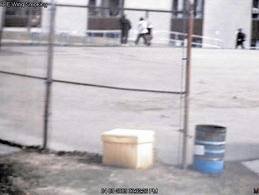 All the community and the police had was this grainy piece of video footage. Then unexpectedly, late in April there was a brief reprieve from Tara’s vilification. Photos from the candlelight vigil held for Tori at the IGA plaza parking lot on April 12th started to surface. And in them a woman was sited, and she had a remarkable resemblance to the composite sketch that police had issued on April 21st. The likeness between the two was uncanny. People got excited. This woman’s picture was posted on some of the local blogs with comments hoping police were looking into this. Nothing ever evolved from this though. We can only suppose the police investigated and found nothing.
On April 28th, 2009 Tara drew attention back to herself when she came forth to the media and police with the incredulous story of a mysterious benefactor who supposedly approached Tara with an offering to fund a $50,000 reward for information on Tori’s whereabouts. The story entailed a clandestine meeting in a hotel that she was somehow chauffeured by limo to without tipping off the press surrounding her house. It was like a page torn out of a modern day action flick- except this was real life. These things just don’t happen. Maybe Tara offered this up as a means of pulling the heat of the public eye off of her, but it only served to exacerbate things. Her credibility was called into question, and it renewed gossip and rumours that she must somehow be involved.
On May 8th, Tara’s family took a further hit when it was revealed by Tara herself that police have searched the homes of Tara’s half-brother and his mother in Calgary. She also advised the media her home computers had been seized by police. While none of it was proof of anything, many of us in Woodstock, me included, were starting to think, where there is smoke, there is usually fire. And there was plenty of smoke to go around. Not only were they looking at Tara, but now members of her family. What would draw police to Calgary? Something must have got their attention.
To further incite the masses, the beginning of May brought details of Tara’s drug use and drug connections. The rumours of her usage were now fact and Tara herself admitted to the suspected habit. This shifted suspicion slightly, causing people to theorize that Tori was taken to enforce or settle an unpaid drug debt. While Tara was no longer considered “hands on” involved, she was still tied to the notion as the instigator of events – so guilt by association.
 Tori and her brother; often inseparable. So there we were, already in the middle of May and the only thing we had was a whole lot of accusation and innuendo flying around. Tori had been missing for 37 days and the only thing to report was maybe it was the Mom. There was no hard evidence and not a single trace of Tori. No single piece of hard evidence had surfaced. A grainy video was as close as we got and that, in reality, showed nothing more than someone talking to Tori. Hardly damning evidence.
Frustration levels grew in the city and I was now beginning to believe that Tori was dead. As a mother I didn’t want to lose hope but I am also a realist. Child disappears, no physical evidence, let’s face it, she was either dead or taken for the purposes of human trafficking. Either way Tori would never be seen again. I felt so guilty for thinking it, so much so that when asked of my opinion I often glazed over it. Hard for an opinionated person like me. But the city was so sensitive to the case I was afraid to offend anyone.
The police were also a sensitive topic with support falling on both sides of the fence. With no hard evidence, what did they have to offer? Did they know more than were saying? Was there as little development in this case as we the public were lead to believe? We were soon to find out….
Part 1
Part 2
Part 3

 By Pepper Parr By Pepper Parr
BURLINGTON, ON May 2, 2012 In the world of things Heritage time is always a factor which most people take to mean the length of time it takes for a house to become “heritagically” significant.
Turns out that time from the Heritage Burlington perspective means how much time they need to get their reports completed. In a letter to the Mayor last week Heritage Burlington advised they needed to push back the date on which they were going to deliver the results of the ruminations on how to fix the problems related to things heritage.
 Community workshop drew more than 100 people but there was no sense of resolution when it was over. There were more questions than answers and the report that came out of it didn't really answer the questions. And problems there certainly are, much of which was related to the different understandings people in Burlington have about just what having a house listed on anything be it the “inventory”, which is one list, the Registry, which is another list or if you’re on the Designated list. It can be confusing and confusion there has been in Burlington for some time when it comes to Heritage matters.
The city never quite managed to come to terms with just what it wants to do with Heritage and Council isn’t of one mind on the subject either, which doesn’t help. Councillor Dennison who lives in a house that is designated would float the Joseph Brant Museum out into Lake Ontario and set it aflame if he thought he could get away with it.
Councillor Sharman seems prepared to put the rights of the property owner ahead of the rights of the community to have some link to its heritage. If someone owns a property they should be able to do whatever they want with it – if it happens to be historically significant, then the city can buy the building, is the view Sharman touts.
Oakville doesn’t look at its heritage quite the same way and Niagara on the Lake has built a community that earns a living from its heritage. Burlington tends to squabble over its heritage.
Up until very recently the membership of the Heritage Advisory committee tended to have people who would inventory or register a property if you whispered the letter H. A citizen had to fight to get their property taken off the inventory even if they were there as a C or a D property.
While the current Heritage Advisory Committee is completely focused on the report they were to get to Council this June and haven’t done much else – they have decided to recommend that everything on the C and D parts of the inventory be taken off that list. Once their report is presented to the city they will get on with the normal run of business – until then getting property off the inventory will be easier said than done. The delay is something that can be put up with while this refurbished committee gets on with its task of coming up with answers to
The process for placing and removing properties on the Municipal Register and criteria for designation
Dealing with property rights and values
Suggesting incentives and support for heritage preservation
What to do when a property owner wants to alter, demolish or restore a heritage property. What processes and procedures should be put in place?
Explain to the public clearly what Legislative responsibility the city has to meet.
Set out a clear decision making processes the public will buy into
Come up with a process for stakeholder and community engagement to be entered into by Heritage Burlington, with input from the Public Involvement Coordinator, before final recommendations are presented to CDC by Heritage Burlington.
It didn’t take the Advisory Committee very long to realize they just didn’t have enough reliable data on which to base the recommendations they were expected to make. They needed to hear what the average Burlingtonians thought and felt about heritage. Whenever heritage came up for discussion there were two clearly defined groups who were usually at loggerheads with each other.
Another problem the Advisory Committee had was when they sought opinions on matters heritage all they had were lists of people who were either very pro or very negative when it came to questions about heritage. They knew what they were going to get in the way of answers before they even asked the questions.
Getting reliable data meant going to the public and asking questions and that meant some public opinion polling for which there was no budget.
Burlington has a public opinion research organization on contract and it was suggested they see if they could scrounge up some money to do a short public opinion survey. It was suggested that the city manager had a fund they just might be able to tap to cover the cost of the research. Ask and you shall be given seemed to work. The city manager has coughed up a total of $20,000 to cover the cost of the survey.
The committee had hoped to have all this done by the middle of June – but when they took a close look at the work load and the way things work at city hall they realized it just wasn’t going to be possible – thus the letter to the Mayor asking for an extension.
With these additional resources in hand the Advisory Committee was able to go forward and produce the kind of report they wanted to deliver. There are some very professional people on this committee who are quite capable of producing the kind of report the city needs.
In their letter to the Mayor the Advisory committee explains that: “Because of unforeseen difficulties in sourcing funding and scheduling key resources, it has become apparent that the original timeline cannot be met to achieve satisfactory community engagement and ultimately a final report of the quality that this project deserves. Moreover, synchronizing our work within the policies, practices, communication patterns and staff workload at City Hall has taken more time than we anticipated.”
The Advisory Committee had bumped into “bureaucratic reality” and had to ask for more time and suggested that:
The public Open House be held May 31st instead of April 25th
Progress report to Community Development be on June 18th
Final report to Community development be September 10th instead of June 18th.
 It had certainly seen better days and when the owner wanted to sell he was told the listing on the Registry would impact on the price he could get - so the property was taken off the Registry - just like that. So much for the intgrity of the Registry. James Clemens chair of the Advisory Committee believes they can do the job they were asked to do within the new time frames. We can expect Council in committee to go along with thus – unless there are some pressing requests to have property removed from the Registry. Then things could get interesting.
In the past there have been people with an “axe to grind” or a personal interest they want to take forward and being on the Advisory Committee they can advance a personal property interest. There is at least one member of the newly constituted committee that has a vested interest and a specific goal, which is not the purpose of this committee even though the objective of the committee member is a laudable one. We are given to believe there is more than one person with what are called “ pecuniary interests” that are not declared. At city council committee meetings the chair begins by asking if there are any declarations of a pecuniary interest. That should perhaps be standard procedure at the Advisory Committee level as well. Putting personal interests first isn’t tolerated at Council and shouldn’t be tolerated at advisory committees either.

 By Pepper Parr By Pepper Parr
BURLINGTON, ON May 2, 2012 The Sustainable people are taking to the road with bicycles Sunday May 6th to let people get a clearer sense of what the city has to offer cyclists and point out where some of the problems in getting around on a bicycle are located.
The event will begin at the Central Library at 2:00 pm on the Sunday and wind their way from the Library to the Centennial Trail and pedal across to Spencer Smith Park and join up with the old Grand Truck – CN rail line and out to the canal and then back to Lakeshore Road where riders will cross to the North side of the street and take either Nelson or Brock and work their way up to Caroline and travel east to Brant and South to city hall.
 Some might choose to take a break along the Spencer Smith part of the Sunday Sustainable bicycle ride. Starts at the Library - 2:00 pm The event is Burlington’s first Jane’s Walk event which is held in hundreds of communities across Canada to celebrate the life of Jane Jacobs, one of the leading urban thinkers who made significant changes to the way urban development was done in Toronto before she passed away in 2006.
The event is being sponsored by the Sustainable Development Advisory Committee with help and support from the cycling committee.
The Jane’s Walk events started out in 2007 as walking tours of urban centres but quickly grew and with suburban communities getting on this band wagon the bicycle has become the mode of transportation for many communities.
Jane Jacobs was an urbanist and activist whose writings championed a fresh, community-based approach to city building. She had no formal training as a planner, and yet her 1961 treatise, The Death and Life of Great American Cities, introduced ground-breaking ideas about how cities function, evolve and fail that now seem like common sense to generations of architects, planners, politicians and activists.
Some of that common sense has yet to work its way to Burlington but there is hope. If you are planning on taking part in the review and update of the city’s Official Plan you could certainly do much worse that reading what Jane Jacobs has written.
Jacobs saw cities as ecosystems that had their own logic and dynamism which would change over time according to how they were used. With a keen eye for detail, she wrote eloquently about sidewalks, parks, retail design and self-organization. She promoted higher density in cities, short blocks, local economies and mixed uses. Jacobs helped derail the car-centred approach to urban planning in both New York and Toronto, invigorating neighbourhood activism by helping stop the expansion of expressways and roads. She lived in Greenwich Village for decades, then moved to Toronto in 1968 where she continued her work and writing on urbanism, economies and social issues until her death in April 2006.
A firm believer in the importance of local residents having input on how their neighborhoods develop, Jacobs encouraged people to familiarize themselves with the places where they live, work and play.
On Sunday we get to play on the trails and paths in Burlington. Paul Toffoletti, Chair of the Sustainable Development Advisory Committee, has no idea how many people are going to show up, “maybe twenty” he said. Surprise Paul and let’s get 100 people out there on bicycles.
Burlington has two other bicycle centric events during the summer months.
What we don’t have is that Olympic trials event that was going to see the streets of the city and rural roadways used by cyclists wanting to qualify for the Olympics that will take place in London, England this summer

 By Mark Mattson, Lake Ontario Waterkeeper By Mark Mattson, Lake Ontario Waterkeeper
BURLINGTON, ON May 2, 2012 I remember the first time I sat around a kitchen table in a rural community giving environmental law advice. I was speaking with a farmer who was beset by pollution running across his fields and destroying his fish and hunting camp along the Rideau Canal.
The family had asked my law firm what we could do about the landfill leachate from a major Ontario city dump that was destroying habitat. No one from the City, the waste company or government had offered to help them. Now everyone in the room — his wife and mother at the wood stove, his sons and daughters and grandkids around the table — was keenly awaiting what I had to say.
I asked: Are there any fish in the fields, ditches or nearshore? The family told me the bay was once the best fishing area around and that fish still spawned in the fields and ditches every spring.
I asked: Can I get access to the water draining from the dump to sample as it runs onto your land? The family told me the exact locations where the water bubbled up on the dump walls and ran year-round onto their property.
I answered: I can help.
 Mark Mattson is the full-time President & Waterkeeper with Lake Ontario Waterkeeper. A criminal lawyer by training, Mattson works tirelessly to champion due process and public access to clean waterways. As a testament to his commitment, Mattson co-founded Lake Ontario Waterkeeper in 2001. As the primary spokesperson for the charity, he gives a voice to the cares and concerns of the millions of people who live in the Lake Ontario watershed. Mattson is a committed member of the Waterkeeper movement. Mattson founded a volunteer-based effort dedicated to identifying and prosecuting environmental offenders. He has acted as counsel for environmental and public interest groups at over fifty hearings, including the Walkerton Inquiry. Mattson has been investigator and/or co-counsel on nearly every Fisheries Act private prosecution in Canada. We documented the fish in the ditches and the bay. We sampled the leachate (it was toxic). We contacted government authorities and the company, alerting them that we had evidence the dump was in contravention of the Fisheries Act. Immediately, they took action to stop the pollution. To this day, that area on the river is protected from landfill toxins.
My story is not unique. It has been played out across Canada thousands of times. When evidence of a Fisheries Act contravention was compiled, the harmful acts were almost always stopped.
Even when government or industry did not act, the Fisheries Act allowed citizens to enforce the law independently. In fact, the Fisheries Act says that, if convicted, a polluter pays half of the fine to the individual who brought the charges. This is meant to “encourage the public to participate in the protection of community resources.”
Such citizen-led actions form an important part of Canada’s environmental protection laws. In the past 16 years, I have personally been involved in investigating legal actions against the Cities of Kingston, Hamilton, Moncton, Montreal, and Toronto as well as the Ontario Ministry of Environment, Ontario Hydro, OPG, DTE and other polluters for Fisheries Act violations. That work resulted directly or indirectly in clean-ups on the Cataraqui River, Humber River, Moira River, Petitcodiac River, St. Clair River, Lake Ontario, St. Lawrence River and other waters across Canada.
All of this was possible because the Fisheries Act made it illegal to pollute or destroy fish and fish habitat in Canada. The offenses under the Act were criminal in nature, meaning enforcement was free from political interference or economic lobbying by industry. The laws protected every community, regardless of the size of the project, the abundance of fish, or the “economic value” of nature.
That is all about to be wiped out. The budget implementation bill that Parliament is considering now radically changes the Fisheries Act. Under the new law, cabinet ministers and industry will have unprecedented influence over fish and fish habitat policy.
Under the new law, decisions about which Canadian communities deserve protection will be made based on political and economic factors. There is no role for science or the rule of law.
The consequences of the changes will be felt immediately. Will Lake Ontario’s fish be protected? Or will our small commercial fishery be deemed “insignificant”? Will we see sewage treatment plant upgrades in Vancouver, Victoria, or Halifax? Or will environmental benefits be deemed “insignificant” in light of the cost? Clean-ups like the ones we saw at the dumpsite beside the farmer’s field will most certainly be things of the past.
When I read about the changes, I know that every farmer, hunter, angler, and community member who loves access to swimmable, drinkable, fishable waters will lose out.
I know that, if I was a young environmental lawyer sitting at that kitchen table today, I wouldn’t be able to offer the same help I did all those years ago to the farmer and his family. That breaks my heart.
Mark Mattison is President of Lake Ontario Waterkeeper and can be reached at: https://www.waterkeeper.ca/

 By Pepper Parr By Pepper Parr
BURLINGTON, ON May 1, 2012 – It took all of 30 seconds to pass the bylaw – there wasn’t a word of debate. It authorized the city to send out tax bills in June and September.
The city collects tax money for the Region and for the school board. The 2012 tax levy bylaw reflects the results of the budget processes of both the city and the Region of Halton. The overall tax increase is 1.79 per cent or $16.96 for each $100,000 of urban residential assessment.
The assessment level for your property is determined by MPAC – Municipal Property Assessment Corporation. They figure out what they think your property is worth and the city works from that number. So if MPAC says they think your property is worth $ 358,000 your taxes will amount to 3.58 x$964.36
The 2012 tax levy includes an additional $1.2 million, for a total 2012 contribution of $2.4 million to the Joseph Brant Memorial Hospital redevelopment fund. The first $1.2 million was part of the surplus from the previous fiscal year.
Included in the tax levy was $1.2 million dedicated towards the city’s local roadway resurfacing program.
For every $100,000 of property assessment the city will collect $964.36 in 2012 Here is where those tax dollars went in 2011 and 2012.
2011 2012
City – General $ 366.62 $ 375.12
City – Hospital $ 3.78 $ 7.49
Region – General + Waste $ 232.40 $ 232.92
Region – Police $ 123.60 $ 127.83
Education Purposes $ 221.00 $ 221.00
Total $ 947.40 $ 964.36
City and regional councils set the tax rates for their respective levels of government. The province sets the tax rates for education.
 This is where your tax dollars went The City of Burlington’s 2012 annual operating budget is $196.7 million of which very close to 90% is used to pay for the more than 1000 full time equivalent employees the city has on staff. .
A total of $2.4 million was placed in the holding account for the city contribution to the Joseph Brant Memorial Hospital redevelopment. The city and the hospital are still dickering away on an agreement that will set out exactly what the city dollars will be used for.
The city also has a capital budget of $45.8 million.
When you open that envelop with the tax bill inside do you feel that you are getting full value for the money they expect you to pay?

 By Pepper Parr By Pepper Parr
BURLINGTON, ON May 2, 2012 City Council decided to cancel the construction of the planned wind turbine on the pier being built at the end of Brant street. Six years late, more than $5 million over the original cost, this is a project the city wants to get completed so they can move on and put an end to the withering and caustic public comment.
The city engineers report to a council committee that the Cumberland Street hydro station cannot take a feed of power from the turbine. The solution they put forward is to install a battery pack in the electrical utility room and store the power there and then use it later to light the pier up at night.
 BurlingtonGreen wants to know where the cancelled turbine is and how does Council plan to tell the public about the decision they made to kill that part of the pier project. That solution will cost $70,000 and the council committee takes a pass almost as fast as you can say “jack rabbit”. The committee report gets moved along to city council where most council members felt it would pass easily.
They didn’t factor in the BurlingtonGreen response. Amy Schnurr didn’t know about the committee decision (not reading Our Burlington regularly Amy) and wanted Council to send the report back to Committee where the decision to kill the turbine could be looked at in more detail with the benefit of BurlingtonGreen input.
City Council didn’t buy that argument and voted to not install the turbine on the pier. Done Council thought.
Not quite. BurlingtonGreen writes Mayor Goldring and releases the letter to the media. They said: (We have added some comment in bold type)
Dear Mayor Goldring,
As you would expect, BurlingtonGreen is very disappointed with the unanimous decision of Council to cancel the pier wind turbine. It would have served as an important symbol of Burlington’s commitment to innovation and economic growth as well as providing environmental benefits. We believe the decision to cancel it will send a strong signal counter to our collective goals.
This Council can live with whatever signal gets sent – what it can’t live with is the painful public response had they spent an additional $70,000
Of additional concern is Council’s unwillingness to explore creative (i.e. privately funded) solutions to support the added costs for the project and unwillingness to defer the item to allow for public awareness and an invitation for meaningful engagement. This appears to be very much at odds with this Council’s expressed commitment to do a better job at this.
Council wants anything that even hints at a problem with the pier to just go away.
Moving forward, without the benefit of a staff report our team has some questions I am hoping you can answer or direct to the appropriate staff member.
1: What are the next steps with the wind turbine unit? Who owns it? Is it available for use elsewhere in the City? Will there be any costs as a result of cancelling the turbine order and if so, what is the amount?
No one really knows quite where the turbine is these days. It is part of the law suit with the original contractor and designer. The steel beams that were stripped from the Pier just before Christmas are in storage and will stay there until the law suit is settle. If there is a turbine, and no one knows if there actually is one, the people on the other side of the law suit aren’t talking to us.
2. There were Council comments about a preference to redirect the 100k from Hydro (earmarked for the turbine) to support another, more effective renewable energy project in the City. We would like to learn more about this opportunity and what the process will include as far as specific project opportunities, the 100K funding redirection and the projected timing of this.
Interesting question. While the city wasn’t sure Burlington Hydro was going to let their $100,000 contribution stay on the table now that it is still in the hands of the city – perhaps something could be done. But is BurlingtonGreen looking to Burlington Hydro for an innovative idea? Good luck on that one.
3. We would like to know how and when the cancellation of the wind turbine will be communicated to the citizens of Burlington.
The city probably wasn’t going to say a thing – hoping it would just go away – but now that you’ve asked, the people in public affairs can get creative on the press release. Good luck on that one as well.
Thank you in advance for your attention to these inquiries and we look forward to a response.
Amy Schnurr, Executive Director, BurlingtonGreen Environmental Association
This is what happens when you have an committed, engaged community that cares about what happens to their city. They want to participate.

 By Pepper Parr By Pepper Parr
BURLINGTON, on May 1, 2012 She certainly gave them a run for their money and she scored points Council members didn’t expect her to make and if this had been an academic debate she would have won hands down – but it was just a Burlington city council meeting and Amy Schnurr left the podium with a very disappointed look on her face.
The issue was the turbine that was part of the original pier design. Two weeks ago at Council committee they agreed to cancel the construction of the wind turbine that was once a key feature of the project that is now six years and $5 million over the original budget, That plus the Cumberland hydro station where the energy that was going to be created by the turbine was to go, is incapable of taking energy from outside the existing hydro grid.
City engineers apparently didn’t know this when the project went forward. No one even thought about it when the Pier was literally falling into the lake. To learn from Burlington Hydro that the Cumberland hydro station couldn’t accept energy from outside the hydro grid had some people spitting teeth but other than that there was nothing they could do. Burlington Hydro, which is owned by the city, did say they would not ask the city to give back the $100,000 contribution they had made to the construction of the Pier. But given that the gift was just moving money from one pocket to the other – that concession made little difference.
 BurlingtonGreen Ex Dir Any Schnurr told Council how Kingston had managed to merge its history and the benefits of wind turbines to the benefit of everyone. Schnurr believed Burlington has missed such an opportunity in their decision to abandon a wind turbine on the pier. When the engineers learned that the energy from the turbine had nowhere to go they came up with the idea of putting a battery pack in the electrical room and having the energy go there and be used later – at a cost of an additional $70,000 That just wasn’t on and the turbine was dropped like a hot potato. The last thing this Council wanted was anything about the Pier that might even look controversial. This was a “no brainer” as one council member put it.
Not so fast said Amy Schnurr, BurlingtonGreen’s executive director . She wanted at least a staff report that would look at what the original benefits to the pier were with the turbine and then she advanced her case that the turbine should be a part of the pier, arguing that it would become something iconic for the city; that it would appear in all the city’s promotional literature and that in time the Cumberland station would be capable of taking a hydro feed from outside the grid.
Anything that even sniffs of renewable energy is BurlingtonGreen turf. They saw the turbine as a renewable energy feature and on those grounds alone they felt it should remain. Cost – well that wasn’t something they wanted to give much consideration to. Did the city look at the pay-back cost of closing King Road when the Jefferson salamander was crossing the road? Did they look at the costs or the payback period when they put in bicycle lanes?
 Wind turbines on Wolfe Island close to Kingston, ON now dominate that city's skyline. BurlingtonGreen thinks we missed an opportunity to create an icon for our soon to be completed pier. Schnurr believed there was a rationale given to support the benefits of the turbine serving as a high profile feature and a marketing tool when the design work was done and she wanted the city to at least review that rationale. She may have been right from a policy aspect but the politics of spending anything more on the pier was just not on. The fervent hope for this Council was to get to opening day without any problems.
Schnurr said BurlingtonGreen was unaware of the plans to kill the turbine – they just stumbled across this when reviewing the webcast of the committee meeting. The story was told the day after the meeting in Our Burlington..
Schnurr had one main point to make – the missed opportunity. The turbine has been ordered. Install it and be transparent about its purpose both in the short and long term.
Take full advantage of what could become a visible profile of the city. Unfortunately Schnurr was forgetting about the 22 storey “landmark” structure that a developer has a right to build a bit more than a stone’s throw from the pier. She felt Installing the turbine would somehow push Ontario’s Power Generation to upgrade the Cumberland station – don’t think this puny little turbine is going to cause Ontario Power to do very much..
Councillor Meed Ward was the only person to take the Schnurr seriously; all the others were focused on the length of time it would take to pay back the cost of the battery pack. Meed Ward wanted to know if BurlingtonGreen was prepared to listen as well as speak. She didn’t come away convinced that BurlingtonGreen was prepared to listen and dropped her line of questioning.
 The idea of a turbine on the pier was more for the statement it would make and aesthetics than for the actual energy it would generate. It was not going to be one of those massive wind turbines. One of the things BurlingtonGreen doesn’t do very well is back away from their positions. Schnurr wanted the turbine in place because environmentally it was the right thing to do and cost she maintained should not be an issue. Only a person seriously out of touch with political reality in the city would argue for even an additional dime being spent on the Pier when it is as late as it is and as far over budget as it is. The city’s image has taken a hammering over the Pier and they don’t want to risk the gains they have made in getting the project back on track.
A point that has to be made is that the turbine originally planned for the Burlington pier was relatively small and was thought of at a time when “going green” was new and the designers thought the turbine would make a strong statement. In terms of generation capacity the turbine was very small and certainly not something that would loom out over the city.
Schnurr argued that to not include the turbine would be tantamount to saying “if you want to go green, forget about Burlington” and on that level she was pretty close to dead on. The city is not seen as a place that fully embraces the “going green” approach. That’s a battle worth continuing but it won’t be fought on the platform of the pier. BurlingtonGreen will have to find some other battlefield.

 By Staff By Staff
BURLINGTON, ON May 2, 1012 – A couple of weeks ago the Liberal Party of Ontario pulled a dirty on Jane McKenna, the Burlington member on the provincial Legislature. Jane McKenna, not one to let anyone push her around rose in the Legislature to speak on a matter of personal privilege and then proceeded to tell the speaker all about the dirty trick the Liberals had played on her. She wanted the Speaker to do something about it.
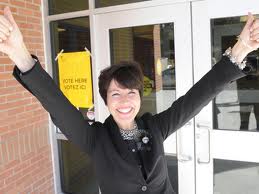 She won the election but she didn't win a ruling from the Speaker in the Legislature. The Liberals will think again before they pull the RoboCall trick on Jane McKenna again. In a phrase the Speaker said: Not this time Lady Jane; you’re just going to have to suck it up. Here is how the issue played out in the Legislature this afternoon.
On April 24, 2012, the Member for Burlington (Mrs. McKenna) rose on a point of privilege concerning
the impact of automated telephone calls on her ability to carry out her MPP duties. The Government
House Leader (Mr. Milloy), the Member for Parkdale–High Park (Ms. DiNovo), the Member for Simcoe–
Grey (Mr. Wilson), the Member for Renfrew–Nipissing–Pembroke (Mr. Yakabuski), and the Member for
Cambridge (Mr. Leone) also spoke to this matter.
Having had an opportunity to review the Hansard for that day, the information provided in the notice, and
the relevant procedural authorities, I am now prepared to rule on the matter.
The Member’s point of privilege relates to automated telephone calls sent to thousands of constituents in
her riding. The calls, which she claims are sponsored by the Ontario Liberal party, indicate that the
Member was, at the behest of her party, planning to vote against the forthcoming Budget motion, thereby
forcing an expensive, unwanted election and jeopardizing funding for a local hospital. The calls, which
indicated that the Member needed to put families first, allowed constituents to share their concerns with
her by pressing number 3 on their telephone keypad; this action would automatically connect them to the
phone number of the Member’s office. The Member’s office was inundated with over 1,500 telephone
calls that swamped its telephone lines and voicemail system.
According to the Member, this resulted in the following:
• Some constituents could not reach the Member.
• The Member had to deal with the telephone calls generated by the automated calls, instead of
telephone calls from other constituents.
• There were service complaints that unjustly damaged her reputation with her constituents.
The Member was of the view that the automated calls obstructed and interfered with her parliamentary
duties and therefore established a prima facie case of privilege.
Before determining whether there is a prima facie case based on obstruction, let me say first that I will
not assess the veracity or tenor of the allegations and opinions made in the automated calls; it is not for
the Speaker to say that they are misleading, inaccurate, false, or inflammatory. Given the political nature
of their workplace, Members are often exposed to criticisms for their actions or intended actions. Dealing
with allegations, opinions and criticisms is part of the job of being an MPP.
That being said, there can be no doubt that obstruction of or interference with a Member in respect of his
or her parliamentary duties can be a matter of privilege. Many of the relevant authorities on the nature of
obstruction were mentioned by the Members who spoke to the matter on Tuesday, and so I will not refer
to them in this ruling. However, what needs to be said is that a Member’s constituency case work and
other constituency responsibilities, while important, are by their very nature distinct from a Member’s
parliamentary responsibilities. As Speaker Carr indicated at page 30 of the Journals for April 26, 2001:
Speakers have consistently found – supported by the procedural authorities and a multitude of
precedents – that privilege attaches only to a Member’s parliamentary duties, and not to
subsidiary duties away from Parliament.
Furthermore, citation 92 in the 6th edition of Beauchesne’s Parliamentary Rules and Forms states as
follows:
A valid claim of privilege in respect to interference with a Member must relate to the Member’s
parliamentary duties and not to the work the Member does in relation to that Member’s
constituency.
The privilege that protects a Member in respect of what he or she says and does in this House and its
committees is known as “parliamentary privilege”; a privilege known as “constituency privilege” does
not exist in Ontario or any other jurisdiction that subscribes to the Westminster model of parliament. To
those who would claim that this demarcation relegates Members’ constituency responsibilities to a
courtesy or inferior status, I would say that parliamentary privilege provides Members with a set of legal
rights and exemptions that more than 13 million other Ontarians do not have. The glass is half full, not
half empty.
The Member for Burlington states that her reputation has been damaged because of the numerous servicerelated
complaints that were made after the automated calls interfered with her office’s usual routine. I
would agree with the Member that damage to a Member’s reputation can amount to obstruction if the
Member is prevented from carrying out his or her parliamentary functions. I make the following
observations about the application of this proposition to the facts in the case at hand:
First, the Member did not indicate how the remarks in and the unwelcome consequences of the
automated calls prevented her from carrying out her parliamentary duties. For example, the
Member did not claim that the automated calls prevented her from speaking in the House on the
Budget motion, or from voting on that motion. The calls only appear to have affected her nonparliamentary
duties, which (as I have already indicated) are not protected by parliamentary
privilege. The best that can be said is that the impact on the Member’s parliamentary duties has
been indirect or tangential – which is not enough to make a case for obstruction based on damage
to the Member’s reputation.
Second, many of the rulings mentioned in the House of Commons Procedure and Practice that
are authority for the proposition that damage to a Member’s reputation can amount to obstruction
deal with MPs’ use of Commons mailing privileges to send misleading information to another
MP’s constituents. In the case at hand, however, there is no indication that Assembly resources
were used to produce or disseminate the automated calls.
Third, the Member for Burlington refers to a remark made in a 1985 ruling by Speaker Bosley of
the Canadian House of Commons. That ruling is about an advertisement that identified a former
MP as an MP; this is not the situation in the case at hand.
Fourth, I have reviewed a December 13, 2011 Canadian House of Commons ruling involving an
incident where an MP’s constituents were the subject of an organized telephone campaign survey
that, in the view of the MP, negatively affected his reputation. I have also reviewed a March 6,
2012 Canadian House of Commons ruling dealing with an incident in which an MP’s office was
inundated with telephone calls, emails and faxes that, in the view of the MP, hindered him and his
staff from serving his constituents and that prevented constituents from contacting him in a timely
manner. In both cases, Speaker Scheer ruled that a prima facie case of privilege was not
established because the MP had been able to perform his parliamentary duties.
For these reasons, a prima facie case of privilege has not been established.
That being said, I have considerable sympathy for the difficult spot that the Member for Burlington found
herself in last week. Like other Members, I have no doubt that she strives to serve her constituents to the
best of her ability, regardless of how they contact her. Although I cannot prevent an outside organization
from using automated technology to facilitate constituents’ contact with their Member, I would encourage
Members and parties to disassociate themselves from any technology-based communication that is
inspired by a political calculus that detracts from civil discourse on public business, just as I would
discourage any member from crossing into another’s riding by any means for the express purpose of
discrediting that member. In other words, take the high road.
I thank the Member for Burlington, the Government Member for Renfrew–Nipissing–Pembroke, and the Member for Cambridge for speaking to this matter.
And they did all this on your dime. Painfull.

 By Pepper Parr By Pepper Parr
Burlington, Ont., May 1, 2012 – It wasn’t the way Wayne Easterbrook expected the trip from Niagara Falls back to Kingston to go. He and his wife had been on a short rest and recreation jaunt to Niagara Falls, when on the way back home everything very suddenly went very, very wrong and years of armed forces experience kicked into action and Warrant Officer Easterbrook was doing what he was trained to do – and do very well.
“People were yelling and screaming all over the place”, said Easterbrook. “My wife had been injured and is still recovering but there were people now needed help and so I helped.”
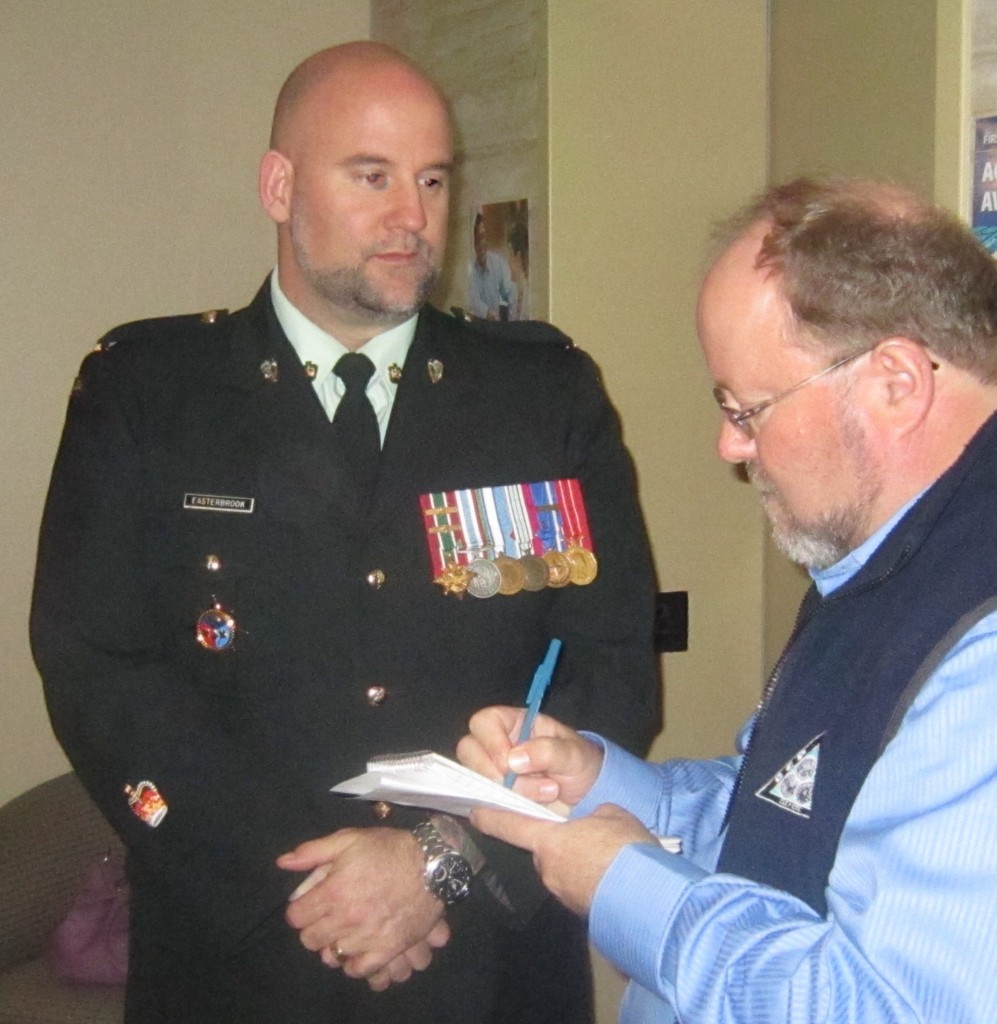 Army Warrant Officer Wayne Easterbrook talking to news reporter about his experience on derailed VIA train 92. Easterbrook was one of five people recognized by the Burlington city council for their brave and selfless acts. Burlington Mayor Goldring said. “Each of you contributed in a different and important way to the well-being of those who needed you so urgently following the tragic circumstances of the February VIA train derailment.”
Recognized along with Easterbrook were: Joette Cantafio and Greg Mohoruk, Ceilidh Gillies and Dean Melnyk.
Easterbrook, who is a Warrant Office with the Signal Corps of the Canadian Army, based in Kingston, began helping people out of the derailed passenger car moments after the impact. In his statement Mayor Goldring said: “Easterbrook assisted many people on board the lead passenger car prior to, and after, the arrival of emergency services personnel. He stayed to assist even after his wife was significantly injured and taken from the scene.”
 Passenger cars of VIA train # 92 were smashed together with passengers inside. There were no passenger fatalities. VIA employees Joette Cantafio and Greg Mohoruk were at their home in Burlington on Feb. 26, enjoying their Sunday off, when they heard about the derailment. They went to the site right away to volunteer their help.
The two canvassed passengers for vital information such as names, addresses and final destination, reassuring them that they would be taken care of. Greg helped to gather luggage that had been collected from the train, transferring it to the waiting bus. Joette stayed with the passengers for the bus transfer to Toronto. Once there, she made sure that everyone’s needs were taken care of.
Ceilidh Gillies, another VIA employee was on the train alone in the last car at the time of the derailment. Ceilidh helped gather information from the manifest and confirmed that there were three employees in the engine car. She made several calls from that car to VIA, which assisted in a quick response.
Dean Melnyk, VIA service manager was also on the train at the time of the derailment. Melnyk stayed on the train until almost all patients had been removed from the lead passenger car, even though he had also been injured. He assisted crews with moving passengers from the train and helped with French translation for the large number of passengers who have French for a first language.
Mayor Rick Goldring tonight presented certificates of recognition to five people, including one Warrant Officer aboard VIA Rail train 92 that derailed in Burlington on Feb. 26 and four VIA staff who helped those in need.
 Three VIA employees,all engineers in the diesel pulling the train were killed in the accident. Train is being righted for removal. Luis Calhau, Manager of Customer Experience for VIA said to Council: “On behalf of my fellow employees at VIA Rail, and especially on behalf of our customers who were on train 92 on February 26, I extend our heartfelt appreciation to the City of Burlington, the personnel at the various emergency services who helped that day and in the days following, as well as the many others who offered whatever help they could,” said “Your response was rapid, professional, and most of all, caring. It is our honour to be here tonight to receive awards.”
The federal Transportation Safety Board has said speed was a factor in the derailment. It said the train was traveling 67 m.p.h. (108 km/h) when it went through a crossover, where the speed limit is 15 m.p.h. (24 km/h).
The accident also injured 45 of the 75 passengers on board.

 Part 3: Part 3:
This series is a first person account, told by a parent who has lived through the fear and pain that rocked Woodstock when an eight year old girl was abducted on her way home from school and subsequently murdered. Elizabeth Maloney takes us through each step of the ordeal and starts with: A girl the same age as my daughter – is missing, she didn’t get home after school. The worry sets in. No longer can a parent feel reassured by the spotlight of safety once provided by broad daylight. Things are different now. It can happen anytime, anywhere, and the most gut-wrenching of all; to anyone.
By Elizabeth Maloney
WOODSTCOK, Ontario May 1, 2012 The first degree murder trial of Michael Rafferty, had been moved to London, Ontario. Terri-Lynne McClintic had already pleaded guilty to the murder of Tori Stafford. The prosecution has made their case against Rafferty – his defence counsel has said Rafferty will not testify and that they will call just the one witness. The trial will move to its closing phase by the end of the week. But back in 2009 we were at the beginning of the story of this horrendous crime and it is important to understand what the community was going through.
 The pictures of a cute 8 year old child now missing had captivated the community. It was to get worse. On the first full day she was missing her name was Victoria Stafford and the Woodstock girl’s face was emblazoned on flyers and all over television. The media broadcast the typical missing person description: 5’4” tall, 62 lbs. with blue eyes and short blonde hair. Last seen wearing a green shirt, denim skirt , black and white shoes and a black Hannah Montana jacket with white fur-lined hood; possibly carrying a pink and purple Bratz bag. And that was all we knew of the missing child.
Over the next couple of days Victoria became “Tori”- the affectionate short-form of her name that her family and school mates called her. The police and media gave us the cute tender little insights to Tori in an attempt to humanize her, presumably to entice her abductors into releasing her. We learned Tori was just like other girls her age. She was a precocious, inquisitive child whose favourite colour was purple. Tori liked puppies and butterflies. She was caring and had a tight relationship with her eleven year old brother Dylan.
The appeal did not work on Tori’s abductors but it certainly did on Woodstock. In a few days the community had adopted Tori as their own, many giving freely of their time, volunteering in the search for the lost little girl. She was the topic of daily conversations; ‘Have you heard the updates from the police? Who do you think took her? Do you think we will find her?’ Everyone had a theory or a tid-bit to tell. All of us hoping for the best, but fearing the worst.
 A Mother with a serious drug problem, separated from the Father of her children struggled to keep some semblance of sanity in her life faced a community that for a time suspected her. I did not personally know Tori Stafford, or her parents, Tara McDonald or Rodney Stafford. I knew people who knew them, or knew of them. The theories, viewpoints and gossip that spun, sometimes out of control, throughout Woodstock during her disappearance, are that of the community. We were all lost, terrified, devastated.
As the days of searching dragged on, new information about Tori’s home life started to tell us a lot more about this little girl. Mainly about her home life and the type of relationship she had with her parents and brother. This little girl, that most people in the city did not know before her abduction, was now becoming someone whose home life and the intimate details of her family’s situation was being talked about by everyone. There was no shortage of sympathy or worry for her.
The first thing that came to light was that Tori was not staying with either parent at the time she was abducted. She and brother Daryn had been living with their maternal grandmother, Linda Winters. It had yet to be fully explained why this was the case, though one might surmise it has something to do with Tara’s issues.
Tara McDonald, Tori’s mother, was living with her boyfriend James Goris and had actually just moved to a new place a week before Tori’s abduction. Many in the community have theorized that Tara’s addiction to the painkiller Oxycontin is the reason for her childrens alternate living arrangements.
Tara had been known in the community for her drug use; it was hardly a secret. Whether Tara had moved the kids in with her mother because she knew she was not able to look after them while battling her drug addiction or if the drug addiction left no room for the children in her immediate world was heavily debated in the community. There was more than enough “judgement” going around to satisfy everyone.
Whatever the reason, it was clear there was some kind of disconnect between Tara and her children before Tori disappeared.
 Tori's Father, absent from much of his daughters life, struggled in his own way with the suspicion within the community. Rodney Stafford, Tori’s and Daryn’s father was less familiar to the community. According to Tara, Rodney was an absentee father, frequently missing set visits with the children. The rumours throughout the community seem to echo a similar sentiment, however Rodney was not talking- neither confirming nor denying the rumours.
And finally there was Daryn, Tori’s older brother. The media and talk in the city has never disputed the fact that Tori and her brother were close and loved each other very much. They squabbled from time to time as all siblings do, but they always made up. Daryn always walked his sister home from school, save that fateful day.
The community now knew that Tori was a normal kid, just like yours, just like mine. We knew too that her parents were working through their issues and that Tori and her brother were not living with either parent but with their maternal grandparent.
We were now into day five and there is nothing for the public to begin to come to terms with. Where was she, who was feeding her, was she alive? She had just disappeared and no one seemed to be able to do anything. The police were not giving the public the kind of information they needed.
 Tori and her brother Daryn were close to inseparable. He used to walk her to school and pick her up after class. On that fateful day in 2009 - he didn't pick her up. Sometimes it`s easier when we can point to something to explain this type of tragedy, maybe the child had run away or is high on drugs and hiding. But Tori did nothing, nothing but be a normal 8 year old. Woodstock would have to deal with its grief and wait sometime for closure to come to the city.
Meanwhile the suspicions were mounting and the spotlight kept coming back to the parents – but no one could figure out who the woman in the white puffy jacket is and what role this played in the abduction.
It was going to get even more confusing.
Part 3 of a multi-part series.
Click on the link for part 2
Click on this link for part 1

 By Pepper Parr By Pepper Parr
BURLINGTON, ON May 1, 2012 There is a deal – we think. We are certain that they didn’t just turn down the idea of having a citizen donate property to the city on which to locate the old Freeman Station that is sitting almost derelict outside the Fire Station on Plains Road.
City staff asked that any announcement on the property donation be put on hold for a week while – wait for it – THE LAWYERS, go through the paper work. Once that is done – the city will, at a future Community Services Committee meeting, release all the details and then it will go to Council where it will get the seal of approval. This is just the bureaucratic process stuff – unless the city finds there are problems with the property, and there is no reason whatsoever to think there are any problems, staff will say – go for it, make it happen – and then we should see the Friends of Freeman Station be at the point where they are able to take that next major step and make things happen.
 When the refurbishment has been completed and the last brush stroke of paint has been applied - THIS is what the Freeman Station just may look like. It has been a long haul and there is a lot of hard work ahead of this team of people – but they did it.
The station was destined for the scrap heap. Council didn’t want anything to do with the thing, even though they had federal Stimulus money to move and refurbish the building. The city just was not able to find a home for the structure. It wasn’t until Councillors Meed Ward and Lancaster offered to facilitate the community effort to save the station that we saw anything happen.
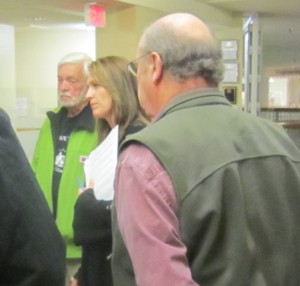 Councillor Meed Ward confers with member of the Friends of Freeman Station after a Council meeting that deferred a decision on where the station would be located. Meed Ward was instrumental in getting charitable status for the group which meant that raising funds was going to get a lot easier. Meed Ward also showed her stripes when she made a move to get major dibs on a chunk of Section 37 money. It remains to be seen if her fellow Council members will go along with her and if the people in the Planning Department are prepared to go along with her interpretation on how that $25,000 should be used.
The community is going to have to get behind this one – and a public gallery filled with people wearing Save The Freeman Station T-shirts at the Committee meeting that hears the details, will have an impact. While the public is not supposed to demonstrate or applaud or boo during a council or committee meeting – perhaps everyone wearing a T shirt could just stand up for 30 seconds. The point would be made and this Council, like any other, is sensitive to public input – if they like the idea.
Who are the people behind this community effort? Councillors Meed Ward and Lancaster are the visible faces and the current chair James Snow is the man you see at the podium pleading the case – but there are dozens of people behind the scenes creating the strategies and coming up with the ideas that have gotten them to where they are.
Les Armstrong is the Past Chair. James Smith is the current chair and is supported by Brian Aasgaard, George Curran, Ron Danielsen, Jacquie Gardner, Alan Harrington, Jane Irwin, John Mellow and Sarah Thompson who serve as Directors.
Secretary Pam Wilkinson (nee Freeman) whose work & family connection to the station have been invaluable to this group and Shelia Gnash’s work in fund raising has, in the words of Chairman Smith been “ phenomenal”.
Michael DeJong has put his expertise to use in developing a renovation budget.
James Smith explains that “our task, given to us by council, was to find a location for the station. Now that we are set to accomplish this goal our organization needs to change its focus somewhat. We need to first focus on the nuts and bolts of moving and restoring the station and raising the money and awareness necessary to accomplish this goal.
 Fashion statement for hip Burlingtonians. $25 each. The Mayor is getting one. If you’re one of those people that likes rolling up your sleeves and build something rather than just talking about it and you have some skills at building and fixing – keep an eye out for this one. Once the Friends of Freeman have their act together and have moved into the “building mode” this is a group you might want to work with.
The first step is to buy a T-shirt and wear it often – let the wider community know that something significant has taken place in Burlington.
Most people in the city are OK with the idea of seeing the station refurbished and put to a good use – but they don’t want any public money used to make this happen. That is a very simplistic look at the way things get done. The Freeman Station isn’t a club house for a group of people; it will be a public structure and will be there for years to come to serve the community. It will certainly be a place where the history of the city, the railway that used to serve the city and the various industries that depended on that rail line, can be told.
Burlington was once the biggest fresh fruit producer in the province but you won’t find a word of that history anywhere on the streets of this town. The Freeman Station is an opportunity to rectify that glaring gap in the way we tell our story. But it is going to cost. The citizens have shown how it can be done. They will raise most of the $350,000 it is estimated to refurbish the building – which the city owns and will continue to own and when the building is painted and looks close to brand spanking new the city will have pictures of the thing all over its literature.
They should be prepared to pay at least a part of the cost of getting to that point – $75,000 over two to three years sounds just about right.

 By Pepper Parr By Pepper Parr
BURLINGTON, ON April 29, 2012 After more than an hour in a Closed Session of Council Committee, James Smith came out to the members of his Friends of Freeman Station looking a little bedraggled while the media people walked back into the Council Chamber.
Other than a very curt comment from Councillor Lancaster we knew nothing more than that Council and Staff were going to “pursue the information” they had been given and the matter would come up again at a Council meeting the evening of Monday April 30th.
 Staff has since worked on the file discussing with the owner of the property the FoF want to move the structure and “to clarify the proposed business terms and explore other options discussed in closed session” Staff has since worked on the file discussing with the owner of the property the FoF want to move the structure and “to clarify the proposed business terms and explore other options discussed in closed session”
What has been clarified is just how much is available in the way of funds for the renovation of the building. The FoF have raised about $30,000 of which $21,432 is being held in trust by the city for the FoF.
There is an amount of $20,000 available from a city Capital Account to assist with future relocation/movement/disposition of the Freeman Station. Many expected those funds to be used to scrap the station at a time when Council wasn’t prepared to put any heart or soul into saving the structure. At that time the community appeared before Council pleading for additional time and were given about six months to come back with a solution.
The city had a significant sum from a Stimulus Funding Grant that consisted of federal, provincial and municipal funding. With the cash in hand, the city wasn’t able to find a location for the structure and at that time there was no one on Council prepared to fight for the building. It was only after the 2010 election that put Marianne Meed Ward and Blair Lancaster to Council that we saw any passion given to keeping the station. Meed Ward explained at the time that she was not going to save the station herself but she along with Lancaster would “facilitate” saving the structure. An example of political fudging at its very best.
The Stimulus funding was lost because agreement on just where to put the station could not be reached and so the city asked the other funding partners to let them use it to pave a road somewhere else in the city. Not one of those great moments in the history of the city.
The Burlington Art Centre didn’t want it on their property, the idea of placing it on the south side of Lakeshore overlooking Spencer Smith Park didn’t get any traction. One group thought it would be a great location for a low voltage radio station but that didn’t take off either.
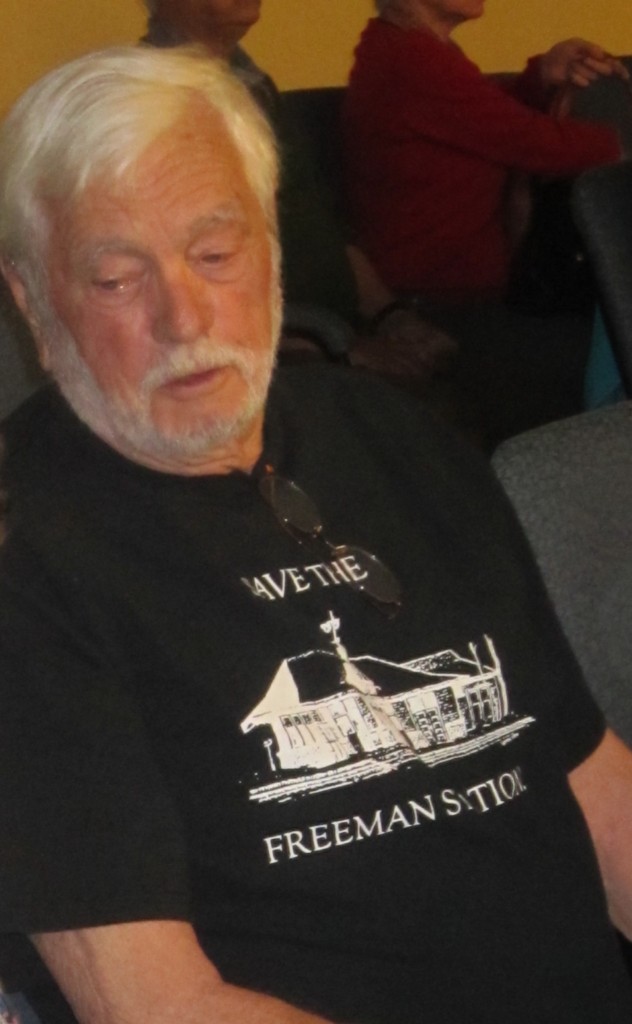 Community stalwarts like Les Armstrong have kept the Freeman Station flame alive. Council will decide Monday evening if their efforts and zeal are going to allow the station to be renovated. The members of the community who felt strongly about the station just weren’t prepared to quit and they have done a remarkable job of putting together a committee that has raised $30,000, gotten themselves charitable status and are now at the point where they believe they have a location to which the station can be moved and renovated and then put on public display.
There is an additional $1900 in a fund from the Save our Station group that was created some time ago.
Councillor Meed Ward showed real chutzpah when she suggested that the Section 37 money that the Molinaro development people paid into the city could be applied to the renovation of the station. A memo from the city’s Development and Infrastructure people set out what they felt that $25,000 could be used for – expect that definition to be challenged by the FoF people.
The city document says
Funding of $25,000 has been received from the Molinaro Group, as a result of a Section 37 agreement, the expenditure of the funds is restricted to assist with the renovation/relocation of Freeman Station ONLY if it is located into the Brock Street area of the downtown otherwise the funds are to be directed to the Public Art Fund. This has been confirmed by the Planning and Building Department.
The use of capitalization for the word ONLY was interesting.
There are those in the city who argue that the Freeman Station is Public Art and would qualify for the Section 37 money under that definition.
What the memo suggests is that the Development and Infrastructure people aren’t prepared to do whatever it takes to save the station. But they bent a lot of rules when they got the Performing Arts Centre built. It would appear that city hall is not yet fully behind saving the station.
 Does the Freeman Station go from here to a dump where it gets cut up for fire wood or does it go to a location where it can be renovated and restored and become a part of Burlington's history that will be seen and appreciated for years into the future? Council decides on Monday. When it has been renovated and sits out there close to the rail line it was once a part of, the city will use pictures of the structure in much of its tourism literature and will, in all likelihood, add that saving the station is what makes Burlington the #2 best city in Canada.
The FoF have access to close to $70,000; they have gotten charitable status and can now issue tax receipts for funds raised. They have solid leadership with sound people on their committee. We would truly be the #2 city in the country if all our citizen committees were this well led. It is the people like Les Armstrong, Jane Irwin and James Smith who make Burlington the second best city in the country and it is the kind of leadership that Councillors Meed Ward and Lancaster showed in this file that makes the city what it is.
There is still time for this Council to do the right thing and work with the Friends of Freeman Station to save the structure and retain at least one piece of the city’s history that tells of the way we transported our young men off to war and let the public see something of the rail system that shipped box car after box car of fruit from Burlington when it was a farming community.
The previous administration failed the city when it didn’t show the leadership it should have. There is an opportunity to correct that short coming and do the right thing this time.
The citizens behind this initiative have been responsible and innovative, far more so than Council on this file, and they deserve the city’s support. It is certainly something Mayor Goldring can now agree deserves the full support of his Council and get behind the project personally. Time to buy a “Save the Freeman Station’ T-shirt Your Worship and wear it frequently.

 This series is a first person account, told by a parent who has lived through the fear and pain that rocked Woodstock when an eight year old girl was abducted on her way home from school and subsequently murdered. Elizabeth Maloney takes us through each step of the ordeal and starts with: A girl the same age as my daughter – is missing, she didn’t get home after school. The worry sets in. No longer can a parent feel reassured by the spotlight of safety once provided by broad daylight. Things are different now. It can happen anytime, anywhere, and the most gut-wrenching of all; to anyone. This series is a first person account, told by a parent who has lived through the fear and pain that rocked Woodstock when an eight year old girl was abducted on her way home from school and subsequently murdered. Elizabeth Maloney takes us through each step of the ordeal and starts with: A girl the same age as my daughter – is missing, she didn’t get home after school. The worry sets in. No longer can a parent feel reassured by the spotlight of safety once provided by broad daylight. Things are different now. It can happen anytime, anywhere, and the most gut-wrenching of all; to anyone.
By Elizabeth Maloney
WOODSTOCK, Ontario April 26, 2012 Day two. Woodstock slept while the Oxford Community Police Services (OCPS) worked on a lead. In typical TV detective style, they retraced Tori’s steps attempting to pin-point the spot from which she was taken. Figuring out the approximate direction and timing of Tori’s movements, police began looking for a witness.
 All the community had was a grainy picture of a woman in a white puffy coat with a little girl walking along beside her. After questioning several people who had been in the area that day, police came across video footage captured from a security camera located at College Avenue Secondary School, a local high school a mere 200 yards away from Tori’s own school, Oliver Stephens. Examination of the grainy video showed Tori walking home from school at 3:32pm, – she was not alone. Walking with Tori was a young woman, approximately 5’1”- 5’2” tall, weighing 120-125lbs with straight long dark hair pulled back into a ponytail. The woman was wearing a puffy white jacket and dark pants.
Tori did not appear in distress, nor did it appear she was being forced into going with this woman. OCPS didn’t know what they were looking at. Was this a friend? Was this someone who merely fell in step with an child and had a one-time conversation? Or was this Tori’s abductor? Rodney Stafford and Tara McDonald, Tori’s parents were brought in to view the hazy footage. Both of them left the station declaring they did not recognize the woman. In the hopes of getting the woman in the video to come forward police took to calling her a “person of interest” rather than a suspect.
The details spilled over the radio as I was getting ready for work. Twelve hours after Tori’s disappearance there was finally a real lead. But a woman- that I did not expect! When I learned of Tori’s disappearance I had subconsciously assumed she had been taken by a man. Did this woman take Tori? Why would a woman take an 8 year old little girl? And most importantly, who was this woman?
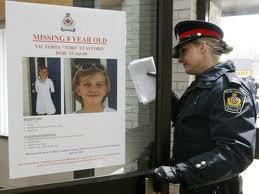 Police posters went up throughout the city. Volunteers took part in searches. On April 10th, two days after Tori went missing, OCPS began conducting ground searches in the city with the aid of volunteers from the community. They searched through backyards and park areas, any spot a child could possibly be hiding. Volunteers were sent door to door asking to check backyards, dog runs, garages- no stone was left unturned. K-9 units, helicopters, trained Search & Rescue were all brought in. I still have vivid memories of the helicopters hovering low over the city.
On day two of the search, Woodstock Mayor Michael Harding announced that police departments from other communities had offered to help look for Tori. By now though, things were taking a more ominous tone. The searches so far had yielded no new information on Tori’s whereabouts and people were really starting to worry. Fears that we might not find Tori alive or at all began to creep into people’s thoughts. Parents began to actively wonder if a predator was on the loose and children found themselves facing tighter restrictions on their whereabouts.
With the assistance of the other communities, leads began to pour in. No matter how small, each one was diligently followed up. But even with all this effort and thousands of kilometres searched there was still no sign of Tori, or any clues to where she was or what had happened to her.
With no answers forthcoming, people in Woodstock began building and grasping at theories to explain away what had happened to Tori. And it didn’t take long for the rumour to surface that the woman in the video was possibly Tori’s own mother Tara McDonald. A really good look at that video footage clearly showed that the woman in the video was shorter and thinner than Tara but that did little to quash the rumours.
Woodstock was obsessed with anything about Tori and what could have happened to her. Whispering about both parents became the emerging trend amongst Woodstonians, and came to a head when Rodney and Tara were subjected to polygraph tests April 12, 4 days after Tori’s disappearance. When police declined to comment on the results of the polygraph, citizens’ tongues really began to wag and the rumour mill was out of control.
Later that evening, 1000 residents of Woodstock gathered in the IGA parking lot located in the centre of town, along with Tori’s family and held a candlelight vigil. The family thanked the citizens of Woodstock for their support and help in trying to find Tori.
It was now Day 5. She was only eight years old and my home town was terrified.
Part 2 of a multi-part series.
Click on the link for part 1

 By Pepper Parr By Pepper Parr
BURLINGTON, ON April 27, 2012 The city sent over two of its coolest cats to meet with Senior`s Centre Board of Management (BOM). Burlington city manager Jeff Fielding and Chris Glenn, Director of Parks and Recreation, made their way into the centre without getting beat up by a senior wielding an umbrella and set out the city`s position on the relationship it needed and the responsibilities the BOM have to meet. It may not have been what the Seniors Board of Management (BOM) wanted to hear.
 There is nothing fancy about the place. It's simple, serves the purpose with a bus stop almost outside the door and plenty of parking. And the kitchen will rustle you up a sandwich if you're hungry. The Seniors like it the way it is. The Centre has a membership of 3,000 – if you’re over 55 – pay the $35. annual membership fee and you’re in – and you can find people to play pool with all day long if you like.
The meeting ended with the city people agreeing to get back to the BOM with a document that will set out what the city has to have and how the city feels everyone’s best interests can be served.
The Seniors have not been certain that the city is really listening to them and the way they want to see their Centre run. Up until very recently the liaison between the city and the Centre was Kathy Lamb, but after years of service Lamb retired from the city, and both the Centre and the city haven’t quite adapted to the change yet.
Last August city council approved a few small changes in the Senior’s Centre constitution with very little comment. Then things began to go wrong.
The city sent someone over to the Centre to talk about “governance” and the centre membership didn’t have a clue – what did governance matter to them?
The Centre is run by a Board of Management that until recently was running quite smoothly – then there was a sudden turn over of the BOM`s membership – seven of the twelve board members have resigned in the very recent past.
A couple of years ago the city realized that it had to look at the operating agreements between various citizen driven operations in buildings that the city owned. Who is responsible for what and who pays for what were questions the city was asking – and they didn’t like the answers they were getting. There wasn’t a consistent policy that applied to every organization.
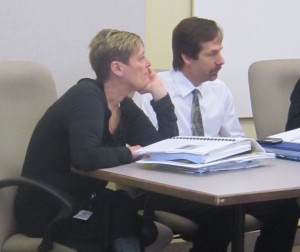 Chris Glenn, on the right, leads the Parks and Recreation department as Director and is tasked with the challenge of bringing the various organizations that use city property under a Master Agreement that is consistently applied to everyone. It should have been done four years ago. Some time ago the city decided that it had to have consistency with all the groups it works with and began meeting with the different organizations to put together an operating agreement that sets out who is to do what and when they are to do it and who is paying for what and how much they are paying.
During the past 18 months the city has been working with the numerous organizations that use city facilities and sometimes deliver city programs. Several of these organizations have had arrangements with the city that were not much more than a handshake and the city wanted to change those relationships to one where everyone was working from the same master agreement that was tailored to meet individual needs.
The Burlington Gymnastics Club went through the process awhile back; the Burlington Soccer Club has gone through the process a number of times. The city found that there were all kinds of agreements out there; some well documented while others appeared to be no more than a handshake and an understanding.
When the city met with the Seniors it didn’t go very smoothly. There was a bit of an uproar and apparently many changes at the BOM management level with people resigning and different view points attempting to prevail – it was never quite clear what the Seniors wanted.
Changing the nature of a relationship is never easy. While the Senior’s Centre BOM may feel they are being picked on by the city, that is just not the case. What the city is doing, and really should have done some time ago, is have all the organizations that deal with the city coming under the same policy.
Parks and Recreation had to go through a painful re-organization and make changes at the very top. Those changes took time but they are now in place and the policy decisions made a number of months ago are being implemented.
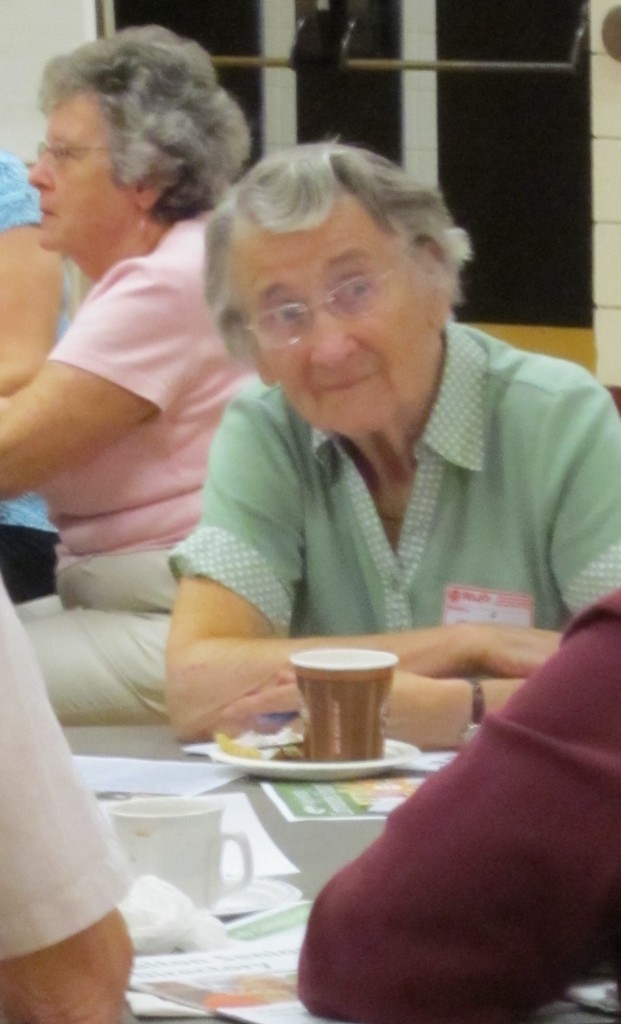 The Seniors Centre is a safe place for older people to meet and socialize with their friends - a critical component of the social network for a city that has a growing senior population. The BOM began to realize the city was looking for some changes but they could never get a handle on just what it was the city wanted to change. The BOM asked the city to put the changes they wanted in writing so they could respond. And then the Seniors waited – and waited.
Many on the BOM were getting anxious. Personality conflicts began to come to the surface. Different operating styles were clashing.
The city needed to have the Centre comply with the policy that was put in place close to a year ago.
The seniors have been waiting for a written response form the city without fully realizing what it is the city has to do. There will be an agreement worked out, but in the end it is going to come down to either the seniors taking full responsibility for the operations – which includes paying their staff and being responsibility for the liabilities that come with that level of management – or the current Board of Management can become an Advisory Board and the city will run the operation.
The city would much prefer that citizens run as much of the program they benefit from as possible. That is the model Burlington uses.
There was quite a fluff when it was suggested a number of months ago that there were big changes in the wind – all, well you know what, broke loose and there were meetings with very large turnouts and the city didn’t do as well as it might have in settling the concerns of the seniors.
 Lawn Bowling Club is right beside the Seniors Centre. In good weather plenty of opportunity to get out and get some exercise and fresh air. The Library is a very short walk away. Much of what Seniors need in the way of civic services are in the immediate area. The Senior’s didn’t do all that well either. They have seen seven of their 12 board members resign in the very recent past. This is not healthy and tells the people on the city side that the senior`s don’t really have their act together.
It takes very little to have a senior on the phone to their council member who usually gets an earful. On one occasion a petition was put together with 500 signatures. The meeting that resulted had 300 people turning out. The Senior`s don`t take prisoners.
Don Crossley, a Burlington senior and local newspaper columnist, was expected to play a modifying role but that didn’t work out. Joe Lamb was brought on Board and Joe Veitch appears to be heading up the Board of Management. Joe Veitch is known for telling developers what he thinks – twice if they didn’t get it the first time. But he hasn’t been as vocal, at least publicly, on the current BOM problems. Veitch just might be the problem and not part of the solution.
The building the Senior`s Centre is in belongs to the city and is made available to the seniors. The city is never going to let any form of private development take place in that area. The city puts on programs at the centre which seniors pay for. The Seniors have a major say in what the fee schedule is for the programs.
The Centre has a kitchen, which is important to those who go to the Centre. There is a cook who runs the kitchen. That person is paid. The BOM has an agreement with the city whereby the lady in the kitchen is on the city payroll because it is much easier to have the city handle all the paper work. Nice arrangement and one assumes the kitchen help picks up all the benefits that come from being on the city payroll.
The BOM uses its funds to pay the person who works in the kitchen. Because the Centre’s BOM doesn’t have an accounting department they put together an arrangement with the city to have the kitchen person put on the city’s payroll with the Centre picking up all the costs. We assume that all really means “all” the costs – including the very healthy pension benefit program.
 Burlington's man in Ottawa, Mike Wallace on the left smiles with Don Crossley and Joe Veitch, on the right. The two Seniors play a large role in running the Seniors Centre. Wallace stay very close to the place - they are a consistently solid Tory vote. The problem the city has with this is that there is a person on their payroll over whom they have absolutely no control – they don`t even know exactly what the woman does and have no oversight on how the kitchen is run. Arrangements like that are “old school”; a leftover from the days of the hand shake agreements and not the way the current, more professional, city staff want to see things run.
That Board of Management has a bank account in which we are advised there is a significant amount of money – much of which comes from bequests that are made to the Centre. It is always nice to see members of an association leaving something for the people they spent time with and enjoyed. The Board of Management (BOM) doesn’t choose to say how much money there is in that bank account. The transparency the BOM expects of the city also has to apply to the BOM, who are concerned that the city will want to see more of that money used to cover expenses the city is now picking up.
The city thus, finds itself having to work with citizens who have earned their retirements and now want to use the leisure time they have in a place that is “theirs”, while the city wants to introduce a level of governance the seniors are not familiar with and for the most part don`t want to have anything to do with. They want things to remain just the way they were – which is not the real world the rest of us have to live with.
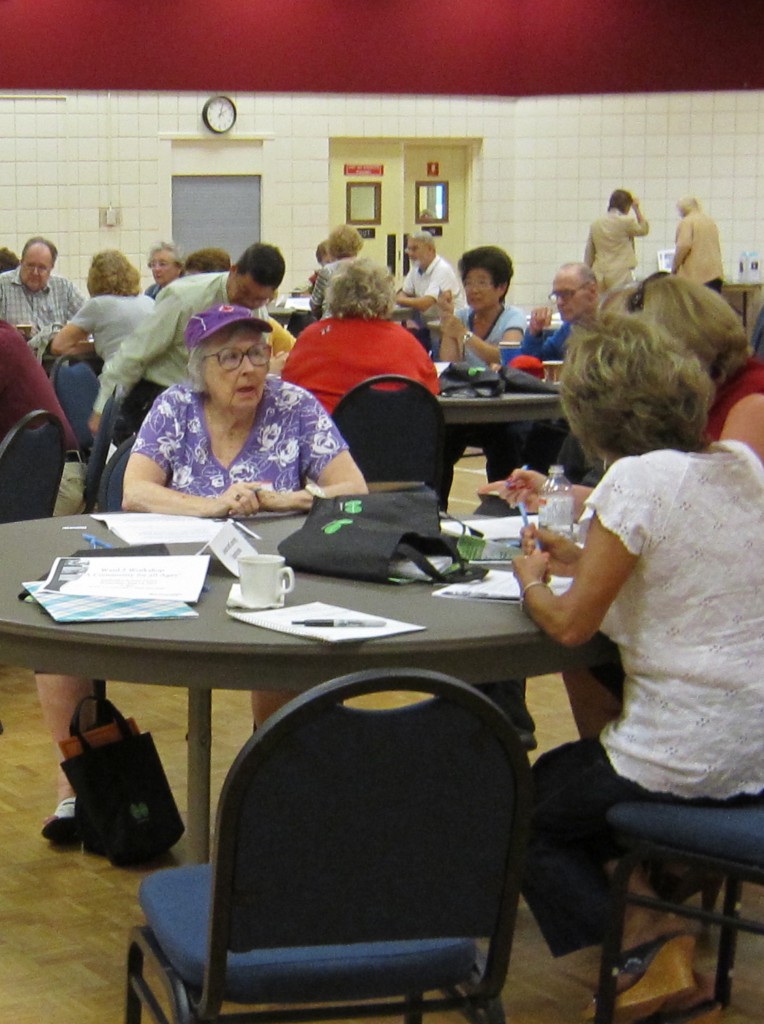 Councillor Sharman has held two public sessions with Senior's as part of his effort to understand their needs and develop policy that Council can put in place to serve this vital community. At most of the sessions Sharman holds, his Dad is often in the audience. The seniors are however, probably the best organized political constituency in the city. When aroused they mobilize themselves and make telephone calls. There is a reason why Councillors Dennison and Sharman have held two hour sessions with seniors groups – those folks vote and they are quick to tell you what they aren’t happy about. Asking them to take the long view and think about the future, gets you that look that goes with a raised eyebrow. They don’t want to listen.
It is going to take a very skilled set of administrators at city hall to clearly understand the needs of the seniors and then come up with ways to communicate with them. It is not going to be easy and city hall staff are going to have to do this one on their own – they shouldn’t expect any help from the council members. That would call for a level of political courage we are just not going to see.
We are told that as we get older some of us revert to what you might call childhood behaviour. When children refuse to listen to reason – for whatever reason – good parents were firm, consistent and fair. And that is what staff at city hall are going to have to do. A lot of patience needs to be added to the mix as well as more than a dollop of respect for the seniors. They have paid the price, the social structure we have is something they built and they want that structure to be there for them now – today, not in six months or a couple of years.
The problem is that the structure the city built has several serious structural flaws that have to be fixed. They know that and are setting out to do the necessary repairs and re-structuring. But the BOM doesn’t appear to like it one bit.
The city will do what it has to do, which is to bring some order and consistency, to the assets it has. Seniors may not like the new approach but it is a more financially responsible way to run a city. It will take some getting used to – but in the end everyone will be better off. Will it get messy – probably.

 By Pepper Parr By Pepper Parr
BURLINGTON, ON April 27, 2012 One of the things about crooks and thieves is that when they come across a good idea that pulls in all kinds of suckers, they use it over and over and over. They will quit only when people stop responding to the scam.
With cyber-crime there is little risk – the people doing much of this cyber identity theft are on the other side of the world and while international level police forces are getting better at pursuing and catching them – it is going to be a long time before we see any arrests. One defence is software we can use to filter them out – but the best defence is checking everything that comes to your screen.
My wife goes over the tape the supermarket cashier gives her – it would never occur to me to look at the take; it`s all bar coded isn’t it – so where could anything go wrong. Well bar codes aren’t perfect.
 The face you think you see - the email address you think you see - may not be coming from the people you think it is coming from. Watch carefully every time. Earlier this week we alerted you to a scam we came across – turns out that this good idea has been taken up by others and now Amazon and Twitter are being exploited.
We got the following related to our Twitter account:
Our system detected unusual activity associated with your account.
Your account may be temporarily suspended for violations of the Twitter Rules.
We suspend accounts for investigation if we suspect an account has been hacked or compromised.
You need to confirm your email address to regain access to your account.
Once you regain access, you will be able to request a new password for your Twitter account.
You can find information on following automations and permitted following behaviors on the help page:
https://support.twitter.com/
The email address this message came from was
Twitter <c-nfxzlxr=znvy-ba.hf-ae0dc@postmaster.twitler.com
Take a careful look at that address – notice they have spelled Twitter as twitler – and that my friends is not the same.
Also the use of English is awkward and that is always a tell tale sign.
We have a Twitter account – we don`t use it very much – so undue activity was the first clue, but had we been using the Twitter account heavily we just may have responded. With the cyber crooks out there ready to do anything they can to steal your identity, you do need to be vigilant.
The same day we got a notice about our Amazon account. We have in the past bought items from Amazon but recently we have supported the local bookstore – A Different Drummer – so we know the Amazon notice was a fake as well. Here is what we got from them:
We received a request to reset the password associated with this e-mail address. Please follow the instructions below.
Click the link below to complete or cancel request using our secure server:
https://www.amazon.com/ap/forgotpassword?arb=84a424dc-5467-b5de-c0a4-8e65672465a4
If clicking the link doesn’t seem to work, you can copy and paste the link into your browser’s address window, or retype it there.
Amazon.com will never e-mail you and ask you to disclose or verify your Amazon.com password, credit card, or banking account number. Thanks for visiting Amazon.com!
Sounds pretty legitimate. But take a careful look at the way amazon is spelled in the domain name part of the email address they used.
See the double m.
Amazon.com account-update@amazomm.com
I don’t think that is Amazon trying to tell me something. I think those guys are crooks trying to get information from me.
What do you think?

 By Staff By Staff
BURLINGTON, ON April 27, 2012 Does Burlington have a “Passion for Compassion”? Spencer Campbell certainly thinks so and is putting his time, energy and some of his money where his mouth is. He has organized the first ever TEDxBurlington event.
TED’s are places where “ideas worth spreading” get put out by recognized speakers. Each presentation is short, less than 15 minutes.
The event, scheduled for May 27th at the Burlington Performing Arts Centre. Speakers include:
 A leader in reducing maternal mortality in African developing countries Dr.Chamberlain is expected to show the difference compassion in action can make. Dr Jean Chamberlain – distinguished McMaster Medical Professor and Founder of www.savethemothers.org (focused on reducing maternal mortality in African developing countries)
Patrick O’Neill – CEO of www.extraordinaryconversations.com and leadership expert who has been involved with, among others, the Middle East Peace Process
Michael Jones – a Juno nominated Pianist who will in part perform during the session and ask us to explore the heart of our own creativity
Josh Nelson – a childhood cancer survivor. Three years ago from a wheelchair Josh asked the Sears National Kids Cancer Ride cycling team to ride for him until the day he could ride with them. Last year he cycled for that noble cause – from Vancouver to Halifax with the same team.
Scott Graham – local author, speaker who focuses on helping kids develop character, confidence and budding leadership
 Trish Barbato guides people on career and leadership issues. She will tell you why you just have to be passionate about what you do. Trish Barbato – author of “Inspire Your Career” and a recognized authority and speaker on career and leadership topics.
Arthur Flieschmann – With his daughter Carly co-wrote “Carly’s Voice: Breaking Through Autism”. One of the first books to explore firsthand the challenges of living with autism.
For information on TEDxBurlington please visit (www.tedxburlington.com) or email us at info@tedxburlington.com attention Spencer Campbell.
In the spirit of ideas worth spreading, TED has created a program called TEDx. TEDx is a program of local, self-organized events that bring people together to share a TED-like experience.
Our event is called TEDxBurlington, where x = independently organized TED event. At our TEDxBurlington event, TEDTalks video and live speakers will combine to spark deep discussion and connection in a small group.
The TED Conference provides general guidance for the TEDx program, but individual TEDx events, including ours, are self-organized.

 This series is a first person account, told by a parent who has lived through the fear and pain that rocked Woodstock when an eight year old girl was abducted on her way home from school and subsequently murdered. Elizabeth Maloney takes us through each step of the ordeal and starts with: A girl the same age as my daughter – is missing, she didn’t get home after school. The worry sets in. No longer can a parent feel reassured by the spotlight of safety once provided by broad daylight. Things are different now. It can happen anytime, anywhere, and the most gut-wrenching of all; to anyone. This series is a first person account, told by a parent who has lived through the fear and pain that rocked Woodstock when an eight year old girl was abducted on her way home from school and subsequently murdered. Elizabeth Maloney takes us through each step of the ordeal and starts with: A girl the same age as my daughter – is missing, she didn’t get home after school. The worry sets in. No longer can a parent feel reassured by the spotlight of safety once provided by broad daylight. Things are different now. It can happen anytime, anywhere, and the most gut-wrenching of all; to anyone.
By Elizabeth Maloney
WOODSTOCK, ON April 27, 2012 It started as just another day on that fateful April 8, 2009. It was so much like every other day I don’t even remember how it began. It was a Wednesday, so I would have dropped my then 8year old off at school and then headed into the office. My day would have passed along , predictably and without incident- or at least I assume so. Even if something exciting had happened that day, it was long forgotten; overshadowed by the events that transpired that night.
 All we had was a picture of a cute kid who we knew nothing about other than that she was missing. It just got worse and worse. To this day, I can’t remember how I learned of the disappearance of Tori Stafford. I know a good friend had sent me an email about the missing girl, but I can’t remember if it was before or after the news bite I heard on the radio during my drive home that night. Either way, it instantly had my attention. I was born and raised in Woodstock and have strong ties to the community through family and friends. No matter where you go, you always know where home is.
Now I know what you are thinking. Children are taken every day, why the anxiety over this particular child? You have to understand that this kind of thing doesn’t happen in Woodstock. And when it does, the entire city will be talking about it; they move into a collective state of shock and then the fear begins to take over.
I called a few friends that night. Coming from a small city I knew there was a very good chance that someone close to me knew the family of the little girl. It only took a couple of calls to learn the disturbing details. A little girl, about my daughter’s age, disappeared while walking home from school that day. She went missing earlier in the day and there was a delay in reporting it to police, although no one could explain why. And the police weren’t saying much at all.
This is when the questions began about the Amber Alert. It was a recurring theme throughout the various conversations that night. Why hadn’t the Oxford Community Police Services (OCPS) issued one? They had a missing child on their hands and it only seemed prudent to get this information out as far and as fast as they could. What was holding them back? Was there something they weren’t telling us? With no communication from police on what was happening, we, the community were left in the dark.
At the end of the day Tori was still very fresh on my mind. I tried to be positive, but let’s face it; no one takes kids off the street to feed them ice cream and tuck them into a warm bed. The grim reality is that children are snatched for sinister reasons and that pervading fear would not leave my head that night. I didn’t want to think negatively but my heart was heavy with the knowledge of what had happened to other children who were taken. The sad part is, at this point, I was actually hoping one of her parents had taken her. I thought it gave her the best chance for survival.
Before heading to bed that night I looked in on my daughter. As I watched her sleep from the bedroom doorway, my mind flashed back to when she was 6 years old and she disappeared one morning before school. I’ll spare you all the details but to give you an idea, the police were called and the neighbours started looking for her. She was found safe and sound 25 minutes later.
It was hands down, the most horrible experience of my entire life. And she had only been missing for 25 horrible minutes! At this point Tori had been gone almost 10 hours. I could suddenly feel the same overwhelming tightness in my chest that I had felt for my daughter when I didn`t know where she was. I couldn’t imagine how her parents were coping. I had the solace of knowing my daughter was safe. They had no such reassurance.
That is the point where Tori and my daughter became tied together in my mind. The two of them shared so much in common: they were the same age, from the same city and had at one point lived within walking distance of each other. These two would have easily been fast friends.
Part 1 of a multi-part series.

 By Pepper Parr By Pepper Parr
BURLINGTON, ON April 27, 2012 You are not going to believe what follows and I doubt very much that you are going to read all of what follows either – it is more than 4350 words long, but we publish the comments made by Burlington MPP Jane McKenna at Queen`s Park, the home of the Provincial Legislature.
McKenna stood in the Legislature on “a point of personal privilege” which is the way members of the Legislature talk about the government preventing them from doing what they were elected to do. It is an old and very honourable tradition.
The Speaker of the Legislature can rule immediately and declare that a member`s privileges were intruded upon or the Speaker can rule at a later date.
If you choose to read the whole debate – and it does get tiresome – you will learn that McKenna was complaining about the now 1500 robocalls that were made to her office. That number seems kind of high given that just 2000 robocalls were made by the Liberal Party of Ontario, but I guess a small fib is acceptable in the Legislature.
You will not believe what the people at Queen`s Park do on your dime. And we elected them. Mercy!
It begins:
The Speaker (Hon. Dave Levac): Yesterday, I made reference to hearing a point of privilege from the member from Burlington. I am prepared to hear that point of privilege today. The member from Burlington.
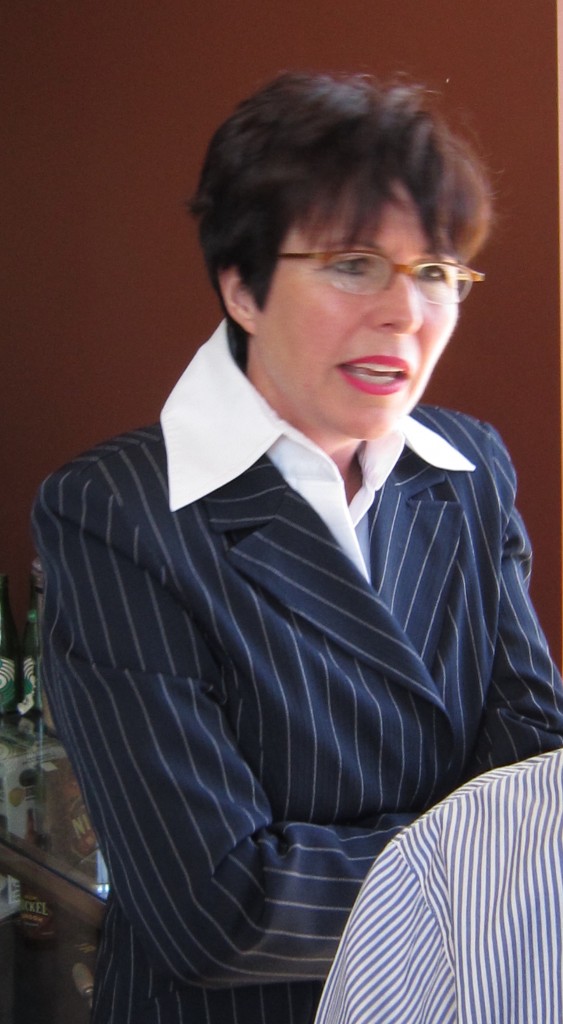 Burlington MPP goes after Liberals on a point of personal privilige. Mrs. Jane McKenna: I rise on a point of personal privilege. I provided you with the appropriate notice, and I will proceed—can I proceed?
In accordance with standing order 21(c), I would like to bring your attention to a point of privilege. Since Monday, April 16, robocalls have been placed to my riding. As a result, my office has been inundated with over 1,500 phone calls to my office.
I raise this issue with you not only because it involves a breach of my privileges, but rather because this point of privilege is about the need to preserve the privileges of all members. I feel for this reason that this is a matter worthy of serious consideration.
First, I will provide you with a brief background of the issue at hand and will then discuss a parliamentary precedent that supports me.
On April 16, 2012, I was notified that robocalls were being sent to my constituents by the Ontario Liberal Party. Callers were informed that I was being told to vote against the budget. They were told that a vote against the budget would force a needless election, and they were told that a vote against the budget would put funding for Joseph Brant Hospital in jeopardy.
I have forwarded to you a copy of the script that appeared in the Thursday, April 19, 2012, edition of the Hamilton Spectator.
In the course of the recording, my constituents were instructed to press 3 on their keypad to be directed to my office.
I recognize and do not dispute that I must serve my constituents and address any concerns that may come up regarding my riding. However, the issue at hand is that due to the inaccurate and fear mongering statements that are being sent to constituents, I have now had to focus on the 1,500 phone calls. As a result, my privileges as a member of this Legislature have been infringed, and I have not been able to perform all of my duties as MPP.
One duty that an MPP is required to do is to provide assistance to constituents on any provincial matter, which I will refer to as “casework” throughout the rest of my submission.
Casework consists of assisting people with issues that they may be having with ODSP, welfare or something as simple as helping them with a driver’s licence or health card replacement.
However, due to these calls, my voicemail was regularly at capacity, which has provided constituents with difficulty in reaching their member for assistance. In addition, these phone calls have tied up my phone lines throughout business hours, impacting those who use their services most: ODSP recipients, seniors, welfare recipients and those seeking unemployment help.
This campaign has severed my connections with those residents, which severely limits my ability to serve Burlingtonians. Not only have these robocalls tied up my phone lines, but they have prevented me from following up with ministry officials and from working on pre-existing casework.
It concerns me greatly that partisan robocalls are tying up non-partisan resources and ultimately preventing me from representing my constituents to my greatest ability. Legislative phone numbers should not be used in partisan campaigns.
The most cited definition of parliamentary privilege can be found in the 23rd edition of Erskine May, which defines parliamentary privilege as “the sum of the peculiar rights enjoyed by each House collectively … and by members of each House individually, without which they could not discharge their functions….”
Furthermore, O’Brien and Bosc break down the peculiar rights as the rights members share collectively and the rights each individual member has. In particular, I draw your attention to a member’s right to be free from obstruction, interference, intimidation and molestation. Because these calls get redirected to my office, they obstruct and interfere with part of my parliamentary duties and thus constitute a prima facie breach of privilege.
O’Brien and Bosc also state that “the unjust damaging of a member’s good name might be seen as constituting an obstruction if the member is prevented from performing his or her parliamentary functions.”
They illustrate this using a ruling from former House of Commons Speaker the Honourable John Fraser. In his 1987 ruling, Speaker Fraser stated that “the privileges of a member are violated by any action which might impede him or her in the fulfilment of his or her duties and functions. It is obvious that the unjust damaging of a reputation could constitute such an impediment.”
I pride myself on representing my constituents and being able to help them when they need assistance. As a result of the robocalls tying up my office phone lines, I have received numerous complaints regarding the service that I provide, which ultimately has damaged my reputation as an accessible MPP. It troubles me that due to these robocalls, some of my constituents feel that I am inaccessible as an MPP. This is not a reputation that any MPP on any side of the Legislature would want to have.
Lastly, O’Brien and Bosc quote a May 6, 1985, ruling from former Speaker of the House of Commons the Honourable John Bosley, which is very pertinent to this case. The ruling states: “Any action which impedes or tends to impede a member in the discharge of his duties is a breach of privilege.”
I am certain that the government will provide you with the ruling from Speaker Jeanne Sauvé, which stated, “While I am only too aware of the multiple responsibilities, duties, and also the work the member has to do relating to his constituency, as Speaker I am required to consider only those matters which affect the member’s parliamentary work.”
However, I will suggest to you that getting information for our constituents from ministers and ministries and assisting our constituents relating to problems with Ontario’s programs is a significant part of our parliamentary work, and is very much of our parliamentary work. Casework does not only occur when we are in our ridings. Many times we are required to do it while at the Legislature and at Queen’s Park. If you rule that casework is not a part of our parliamentary privileges, you would be saying that casework is only a courtesy to our constituents, as opposed to being one of our duties as provincial parliamentarians.
Mr. Speaker, in conclusion, MPPs’ functions are not limited to the Legislature. It is imperative that we remember that our role as a parliamentarian is not limited to the Legislature, and that we are required to assist our constituents’ needs. This is why I urge you to look into this issue.
My ability to serve my constituents has been hindered as a result of my privileges being impeded. It has been impeded both by my inability to assist them, to focus on these phone calls, and, more importantly, because my reputation as an accessible MPP has been damaged due to these robocalls.
Should you rule that this case is a breach of members’ privileges, I am prepared to move the appropriate motion to send this case to the Standing Committee on the Legislative Assembly.
I thank you for looking into this. If you have any questions, please do not hesitate to contact me. Thank you, Mr. Speaker, for your time. I look forward to your ruling on this serious matter.
The Speaker (Hon. Dave Levac): Further comments?
Hon. John Milloy: I rise to respond to the point of privilege that the member from Burlington has raised in the House.
This morning, I received notice from the member and a copy of a letter that she sent to you. In her letter, the member from Burlington states—and she’s just outlined—that since April 16, her constituency office has been inundated with calls from individuals from her riding. The member further states in her submission that it’s her belief that the large volume of calls being received by her constituency office are a result of robocalls, which she alleges have been placed by the Ontario Liberal Party to her constituents, advising that the member was being told to vote against the budget, which would force an election and jeopardize funding for a hospital in her riding.
As a result of the calls into her constituency office regarding her vote on the budget today, the member believes she has been unable to conduct casework in her constituency office. As I say, she has obviously just finished her presentation on this matter.
I would like to first point out that the member herself acknowledges that members’ privileges do not extend to constituency work. I agree with the member, and point the Speaker to O’Brien and Bosc. At page 61, O’Brien and Bosc states, “The privileges of members of the House of Commons provide the absolute immunity they require to perform their parliamentary work….”
O’Brien and Bosc elaborates on this principle, at page 109: “In order to find a prima facie breach of privilege, the Speaker must be satisfied that there is evidence to support the member’s claim that he or she has been impeded in the performance of his or her parliamentary functions and that the matter is directly related to a proceeding in Parliament….While frequently noting that members raising such matters have legitimate grievances, Speakers have consistently concluded that members have not been prevented from carrying out their parliamentary duties.”
Speaker, I suggest that the member has not shown that her privileges have been breached. First, the member has not pointed to any parliamentary work which she has been precluded from performing as a result of the alleged robocalls; rather, the member’s complaints related entirely to the performance of casework in her constituency office. To my knowledge, the member has continued to be able to perform all of her parliamentary work and has not provided any evidence in her letter or otherwise to the contrary.
Secondly, the member has merely laid out allegations that she has been hindered in her ability to conduct constituency casework. The member has not provided any evidence to show that this is in fact the case.
Finally, Speaker, I’d like to point you to a recent decision from Speaker Scheer in the House of Commons which involves similar circumstances. You may recall that in this instance, the MP from Mount Royal argued that robocalls hindered his ability to perform his duties as an MP. In that case, Speaker Scheer found that no breach of privilege had occurred. On December 13, 2011, Speaker Scheer ruled on this issue, arguing that although the member’s constituency office had been bombarded by telephone calls, emails and faxes, the Speaker had “great difficulty in concluding that the member has been unable to carry out his parliamentary duties as a result of these tactics.”
Once again, Mr. Speaker, having reviewed the presentation that has been made and the material that was submitted, I would argue that this does not constitute a breach of privilege. Thank you.
The Speaker (Hon. Dave Levac): Further comments?
Ms. Cheri DiNovo: It is indeed a privilege to be able to comment on the member’s point of personal privilege and her privileges as a member. I am afraid, however, that I would have to side with the government House leader on this one. Certainly, one would want to comment that such a campaign done by a sitting government is egregious and certainly deserves comment. However, I would have to agree with the government House leader that it is not an abuse of privilege for the reasons he stated, because privilege has to do with the member’s capacity to do her job in this place. Were it not so, one could imagine that the huge volumes of email campaigns that are undertaken by constituents for a variety of reasons, the huge volumes of calls that, again, are undertaken by various stakeholder groups, many of them partisan in nature, would also have to be ruled against.
So that is my input, and I hope it helps.
The Speaker (Hon. Dave Levac): The member from Simcoe–Grey.
Mr. Jim Wilson: I certainly agree with some of the comments from the member from Parkdale–High Park when she said it’s—I’m going to change her language and say it’s reprehensible that the member from Burlington’s riding would be targeted. I know the member for Cambridge was also targeted, and I think out Oakville way and Halton, as far as we can tell anyway, Mr. Speaker, with these robocalls, which clearly the government instigated because, when we first brought it up in the House, the Minister of Health knew all about it. She had done a tour of the hospital, aware the robocalls were going on at very the time she was touring the hospital. She was using the exact language in the press conference that she had at the hospital in Burlington, the exact language that the robocall was using. The minister didn’t deny it in two or three rounds of questions in this House. So clearly it comes from the government.
Just in response—because we’re going to ask you to set new ground on this, Mr. Speaker. It’s nice that we always cite old precedents, but we’re in the Internet age; we’re in an advanced technology age. Surely to goodness the ruling shouldn’t be just confined to something that happens in this building. Surely to God, as the honourable member says in her very articulate letter and presentation, our casework is in our constituency offices. It is wherever you are, folks, nowadays with a BlackBerry on your hip or a tablet in your hand. To say that casework can only happen up in my office, 201 north wing, or sitting right here—by the way, we discourage people from tapping away in here, and we are not allowed laptops, so it’s hard to respond to your constituents and do your casework in this House. I think we’re going to ask for a broader definition of what actually are the duties of a parliamentarian, because I know that’s what has been cited by the honourable House leader for the government.
Secondly, Mr. Speaker, the House leader, as I was listening, said that the breach of privilege has to stem from a procedure in this House, in this Parliament. Well, the procedure in this Parliament that all of this refers to is the upcoming budget vote. That is a procedure in this Parliament, so I think that’s relevant, and I would ask you to take that into consideration.
Surely to goodness, as I said, we would ask that we expand our horizon on this thing and not cite things that happened a hundred years ago. We’re in the high-tech age, and I know all of our colleagues in this House work darned hard almost 24/7. Certainly, when we’re at home and when we’re in our apartments at night, we’re doing casework, we’re doing our parliamentary work, and that should be considered in this case, Mr. Speaker.
The Speaker (Hon. Dave Levac): Thank you. Further comment?
Just a technical reminder; this is probably not the time to say it, but I need to say it because it really drives them nuts. When you turn away from the microphone, it’s very difficult for them to pick it up. So I would remind all members to please face your microphone so that Hansard can make sure that we pick it up.
The second thing I’d like to mention is, if we’re going to continue, I would like you to be brief, if there’s anything new to add to it. I’m getting a sense of where this point of privilege is going, so try to be brief, please.
The member for Renfrew–Nipissing–Pembroke.
Mr. John Yakabuski: Yes, Speaker. Can you hear me? Just kidding. Thank you very much, Speaker.
First of all, I want to thank my colleague from Burlington, Ms. McKenna, for raising this point of privilege. I think it’s vital that she stand, as is her right as a member, to challenge actions on the part of the government.
I know that my colleague our House leader from Simcoe–Grey has articulated some of the points. I want to be very clear about one thing: I believe she has made a prima facie case, as she cited precedents in the past with regard to a member’s work and the vital work they do. I want to make it very clear, when the House leader uses the term “alleges”—Speaker, we have basically received an admission from the Minister of Health that they are aware and knowledgeable about the content of those robocalls.
It was not simply about a budget. Yes, it was precipitated by the budget vote, and they used that as their reason for making those calls. But she went on to say—unlike, as cited by my colleague from Parkdale–High Park, where people get involved in an email campaign, which is generally orchestrated by a third party not involved in the governing of this province, this was a robocall campaign about the budget and the member from Burlington that was orchestrated and initiated right in this House, in the offices of the Minister of Health. This is why her privileges have been violated.
A part of that robocall was not the suggestion that, “If you feel this way, you may want to contact the member.” No. It was well orchestrated: “Simply push 3 and you’ll be connected.” It was very well organized and orchestrated and was designed specifically to impugn the right of that member to do their job. Everyone here who has a busy constituency knows—
Interjections.
The Speaker (Hon. Dave Levac): This is an extremely important and serious issue, and the bantering back and forth is not helping me focus on the points being made. I ask all members to give everyone the respect they deserve in hearing this.
Member, continue, but be brief, please.
Mr. John Yakabuski: Her ability to do her work was clearly impugned by the actions of the government. Therefore, I say that in my humble opinion, Mr. Speaker, and as the member has in my opinion also duly indicated by citing precedents from O’Brien and Bosc and others, her privileges as a member of this assembly were indeed trod upon by this government.
The Speaker (Hon. Dave Levac): The member for Cambridge.
Mr. Rob Leone: I’m pleased to speak in support of my colleague the member for Burlington’s point of privilege. I also was going to raise a point of privilege on this matter, but I thought, to save some time, that I would just support the member for Burlington’s point of privilege.
I do want to address a couple of points that were made in the comments and commentary from people who have had the ability to speak on this already. I think one of the issues that was raised was preventing an MPP from performing his or her functions as an MPP. I can tell you, Mr. Speaker, that I actually have gotten calls here in my Queen’s Park office. I have actually fielded those calls myself. I’m not sure if Ms. McKenna has done the same thing in her office, but it’s just a courtesy to relieve some of the stress our staff are being put under. In the process of doing that, I think our functions have been impeded, because we had to spend some time doing that.
One of the other things I wanted to mention with particular reference to the nature of the robocalls is the fact that these robocalls had inaccurate and fearmongering information and statements that were expressed. If you get a phone call from constituents who have an issue and it’s based on what you’ve done in this House, you can explain that away. But if you are trying to correct misinformation, to correct allegations that you are somehow not supporting the hospital, in the case of Ms. McKenna and myself, in our ridings, if we’re spending time trying to correct a record which has not explicitly been based on fact and what has happened in the Legislature—I think that is one of the most troubling things of the robocalls: the fact that they are spreading misleading and fearmongering information.
If I can just be very brief in terms of what that record is, Mr. Speaker, let me just say that since I have been elected in October, I had the privilege of raising the first private member’s business in this House. That private member’s resolution stated an expressed vote on hospital infrastructure projects right across the province of Ontario, including mine—Cambridge Memorial Hospital—which was actually voted on in this Legislature. I have to say that the voting record will show that members of my party—Ms. McKenna from Burlington, myself and the members of the PC caucus—and all members of the NDP caucus voted in support of that motion, an explicit vote in support of our hospital expansions and those projects in our ridings. That is fact. That is based on what we have done, the conduct of what we’ve done in this place. The words that we’ve said, the statements that we’ve made, on record, in Hansard, show and express support on the part of myself, the member for Burlington and other members for their hospital expansion projects.
Now, the allegations being made on the robocalls, Mr. Speaker, actually were included in the member for Burlington’s letter, I believe. There was a transcript that was provided to the Hamilton Spectator. Included in that transcript was an affiliation to the Liberal Party of Ontario.
Also, I want to address the fact that the government House leader said that these are allegations of robocalls being placed on behalf of the Liberal Party. It’s not just the Minister of Health who essentially agreed to it, but it was also the Minister of Finance, during question period last Tuesday, who basically agreed to the fact that they are going to continue to place phone calls in opposition ridings to—in my view—distort the facts and distort the record that we have had on this.
The allegations made and the reason why I believe they’re inaccurate statements that we have to address, that we have to contend and compete with, relate to the fact that they’re equating the budget vote with a vote against our hospital expansions. As I have endeavoured to discover and explore that very notion, Mr. Speaker, the only way that this budget could affect a hospital project is if it’s specifically negated in the budget document.
On page 40 of the budget document, what we see are some projects being negated, none of which include Cambridge Memorial Hospital, in my case, and Joseph Brant Memorial Hospital, in the case of the member from Burlington. So in essence, a vote against this budget is not a vote against Cambridge Memorial Hospital because it hasn’t specifically been negated. This comes from information that we’ve received from the legislative research branch. This is where we’ve discussed and discovered the protocols with respect to what happens during budget votes.
Again, these robocalls were deliberately trying to confuse the voting record and the specific support that myself and Ms. McKenna have had for our hospital infrastructure projects. I want you to take that into consideration because it’s in the nature of responding to the phone calls that we’re having to correct the misinformation that’s being spread about what we’ve done. I think that if we do engage in these campaigns, we should be focusing on the correct voting record and the correct statements that we’ve made. In essence, that’s what we find in Hansard.
I also want to point to some parliamentary precedent that would also be important, I think, in this case, Mr. Speaker. In 2009, NDP MP Peter Stoffer raised a point of privilege in the federal Parliament concerning a mail-out known as a ten-percenter which went to his riding. The ten-percenter said that Mr. Stoffer was in favour of keeping the gun registry. Mr. Stoffer had opposed the gun registry since being elected. Former Speaker of the House of Commons the Honourable Peter Milliken ruled that a prima facie breach of privilege occurred because the mailing sent to his constituents “did distort their member’s true position … and, at the very least, had the potential to create confusion in their minds.
“It may also have had the effect of unjustly damaging his reputation and his credibility with the voters of his riding and, as such, infringing on his privileges by affecting his ability to function as a member.”
I think the member for Burlington and myself would argue that our reputations have been unjustly attacked in the minds of our voters and the people who have received these robocalls.
Once again, Mr. Speaker, a similar case occurred in 2005, when NDP MP Brian Masse also had a ten-percenter sent to his riding that was inaccurate and was wrong about his position on the gun registry, funding for the RCMP, and also his voting record. Speaker Milliken had ruled that a prima facie breach of privilege occurred and “his ability to function as a member of the House has been interfered with.”
Mr. Speaker, I would like to add those cases of precedent to your deliberations on this matter.
Once again, I want to offer my wholehearted support to the member for Burlington on her point of privilege, because I feel unjustly affected by these robocalls as well. Thank you.
The Speaker (Hon. Dave Levac): First let me thank the member from Burlington for making her point as thorough as she did, and I thank all the members who made comment on this case. I’ll reserve my ruling and report back to the House as quickly as possible. Thank you so much for this important discussion.
Can you beleive it?

 By Pepper Parr By Pepper Parr
BURLINGTON, ON April 26, 2012 Halton Regional Police Service have now concluded their Spring Seatbelt Campaign, which ran from April 14 to 22nd. The Halton Hills community got top prize for not buckling up.. Police issued 121 warnings and 103 tickets – which are not cheap if you fail to convince a judge that the police officer got it wrong.
Burlington, that city everyone will tell you is the 2nd best Canadian city to live in, got 22 warnings and 32 tickets issued. Traffic court is going to be quieter down here.
During the campaign the Service utilized a multi-faceted approach assigning all three District Response Units, uniform patrol officers and volunteers to both educate and enforce the importance of the proper use of seatbelts, child car seats and child booster seats.
 If you're unfortunate enough to be in an accident - the seat belt will save your life.. During the year the Service focuses on traffic safety through enforcement, education and liaising with our municipalities on engineering issues. Halton typically demonstrates a high seat belt compliance rate, however there are still those who opt to risk their safety, risk their lives by not buckling up.
Chief Gary Crowell remarked, “our Police Service is committed to enhancing road safety and we will continue to educate and enforce seat belt compliance in an effort to reduce personal injury and fatal motor vehicle collisions.”
A total of 198 provincial offence notices were issued in all of Halton during the campaign.
Oakville came in with 43 warnings and 63 tickets.

 By Pepper Parr By Pepper Parr
BURLINGTON, ON April 25, 2012 It`s sort of like one of those Rodney Dangerfield situations where he just can’t get any respect.
We have certainly had our comments to make about Jane McKenna, the Progressive Conservative MPP for Burlington. But to not invite the woman to an event taking place in the city and then invite Ted McMeekin from the neighbouring riding of Ancaster-Dundas-Flamborough-Westdale is a bit much.
Heck, the Teen Tour Band made the invite list.
 BurlingtonGreen's Michelle Bennett pacing off the size of each lot in the Community Garden that will open this Saturday. The event was to thank the funding partners for the help in getting the Community Garden plots operational.
Honourable Ted McMeekin—MPP for Ancaster-Dundas-Flamborough-Westdale was invited. You know he is going to hold the microphone and talk about the wonderful provincial government project that made the community garden plot possible when it was actually Michelle Bennett and Amy Schneider who did all the work and went before Council committee on more than one occasion to convince the city to support the project.
Mayor Rick Goldring; Councillor Marianne Meed Ward; Community Services General Manager Scott Stewart; environmental community group BurlingtonGreen ; community gardeners; the Burlington Teen Tour Band; and Burlington residents are going to be there. But no Jane McKenna.
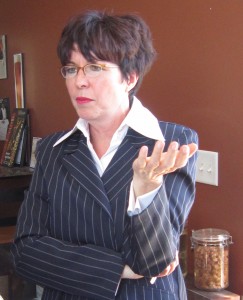 No invite for the Burlington MPP - was this a mistake or is it petty politics. Will we now see a quick reversal and have someone say – golly, we forgot. No one forgets Jane McKenna. You may not be a fan – but this is not a woman you forget. This was really small town, petty politics.
We checked with McKenna’s constituency office and they said they would get back to us. Late in the day there was an email thanking us for bringing this matter to their attention.
Did we forget that Burlington is the second nicest city to live in – and aren’t we supposed to at least be civil to each other?
The garden lots sit in the middle of Central Park, back a bit from the Senior`s Centre. Great idea. It was good enough to get Michelle Bennett nominated as the Environmentalist of the Year.
The actual press release came from the city’s public affairs office – did they goof again and send out the wrong version of a press release ?
My making these comments is going to put me in deep doo, doo with my Liberals friends. They think I should be a little more partisan. And no, Ron Foxcroft, you are not to send me a membership application for the Burlington Progressive Conservative Association. We are being fair here.
The event by the way is at Central Park at 10:00 am; Saturday May 5th

|
|















































































